Day 0
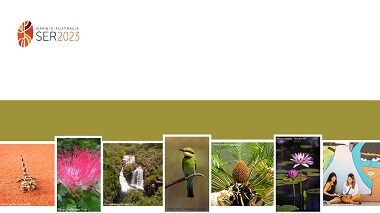
Training Course #114: Technical and hands on training to scientifically monitor and evaluate restoration projects (2 full days). Organiser: Rajkamal Goswami
Even though the concept and practice of ecological restoration has been around for at least a few centuries, since the 1970s it started gaining rapid ground. However, restoration is currently the global buzzword, particularly following the declaration of 2021-30 as the ‘Decade on Ecosystem Restoration’. This has resulted in massive mobilisation of capital and manpower resources at global scales as the world aims to restore 350 million hectares of degraded ecosystems by 2030 – an area almost the size of India. Riding on this massive primary target are many additional goals – such as poverty eradication, improvement in income and livelihoods of local communities, achieving food security, water and biodiversity conservation, combating and reversing desertification and last but not the least, climate change.
However, to date there aren’t any comprehensive monitoring and evaluation protocol and framework for assessing ecosystem restoration projects. In this training course, we will introduce the participants to a ground-tested scientific toolkit based on a comprehensive monitoring and evaluation protocol and framework that we have developed and piloted in India. This toolkit and framework aims to enable the restoration managers, implementing agencies and scientists to empirically measure the impacts and outcomes of restoration across social, ecological, environmental and economic dimensions.
Kakadu Room
DoubleTree Hilton
Training Course #46: Building high quality forest and landscape restoration practices that lead to resilient and sustainable landscapes which provide long-term benefits for people and nature (full day). Organiser: Laura D´Arcy, WWF UK.
The UN Decade on Ecosystem Restoration has defined a set of principles for the practice of restoration in landscapes and on the ground. The application of these principles are key to ensuring restoration interventions deliver high quality results benefitting nature and people. This session will focus on exploring these principles and how they can be effectively incorporated into practice by project developers and other actors promoting ecosystem restoration particularly in the context of forest landscape restoration. The training course will focus on the implementation of Forest Landscape Restoration (FLR) principles and tools to support building and delivering high quality projects.
Litchfield Room
DoubleTree Hilton
Training Course #83: Massive tropical landscape restoration: important hidden operational tips that are not normally shared when managing big projects (2 full days). Organiser: Felipe Marauê Marques Tieppo.
Forest restoration has received increasing attention worldwide for its many benefits. Many steps are required from planning to execution, monitoring and, delivery of the area in the forest restoration process. There are many challenges in this process, especially when it comes to large-scale restoration. The objective of this course is to address all the steps required to implement a large-scale forest restoration program, based on the experiences of the Renova Foundation, responsible for restoring 40,000 ha of native vegetation and 5,000 springs in one of the most degraded watersheds in Brazil. We aim to address topics such as the networking establishment of seed collectors and seedling producers, which connects people with operational demands, the methodologies for choosing areas following criteria based on environmental degradation and its potential for resilience, procedures and important tips for not failing in the planting, maintenance and management of projects, and what are the main attributes that need to be monitored in projects of great magnitude to ensure that the indicators are applicable and can answer whether the planted area is in the process of restoration. For this, over two days, it is planned to present theoretical content in PowerPoint, demonstration of examples and practical exercises, exposure of live material, best practices, and some ways to monitor indicators of restoration. Participants are expected to understand the main steps and challenges for ecological restoration in practice, including the use of new technologies, increasingly popular in the world of forest restoration.
Territory Room
DoubleTree Hilton
Training Course #50: Improving the use and development of native plant materials using data-driven approaches (half day). Organiser: Rob Massatti
Penninsula Room
Hilton Garden Inn
Training Course #7: The ecological restoration game: a group activity for education and community engagement to develop, simulate and present a restoration plan (full day) Organiser: Simone Pedrini
Promenade Room
Hilton Garden Inn
Training Course #114: Technical and hands on training to scientifically monitor and evaluate restoration projects (2 full days). Organiser: Rajkamal Goswami
Even though the concept and practice of ecological restoration has been around for at least a few centuries, since the 1970s it started gaining rapid ground. However, restoration is currently the global buzzword, particularly following the declaration of 2021-30 as the ‘Decade on Ecosystem Restoration’. This has resulted in massive mobilisation of capital and manpower resources at global scales as the world aims to restore 350 million hectares of degraded ecosystems by 2030 – an area almost the size of India. Riding on this massive primary target are many additional goals – such as poverty eradication, improvement in income and livelihoods of local communities, achieving food security, water and biodiversity conservation, combating and reversing desertification and last but not the least, climate change.
However, to date there aren’t any comprehensive monitoring and evaluation protocol and framework for assessing ecosystem restoration projects. In this training course, we will introduce the participants to a ground-tested scientific toolkit based on a comprehensive monitoring and evaluation protocol and framework that we have developed and piloted in India. This toolkit and framework aims to enable the restoration managers, implementing agencies and scientists to empirically measure the impacts and outcomes of restoration across social, ecological, environmental and economic dimensions.
Kakadu Room
DoubleTree Hilton
Training Course #83: Massive tropical landscape restoration: important hidden operational tips that are not normally shared when managing big projects (2 full days). Organiser: Felipe Marauê Marques Tieppo
Monsoon
Hilton Garden Inn
Training Course #74: Strategic and operational management of large ecological restoration programs (full day). Organiser: José Almir Jacomelli Jr.
Penninsula Room
Hilton Garden Inn
Training Course #83 Day Two Massive tropical landscape restoration: important hidden operational tips that are not normally shared when managing big projects
Forest restoration has received increasing attention worldwide for its many benefits. Many steps are required from planning to execution, monitoring and, delivery of the area in the forest restoration process. There are many challenges in this process, especially when it comes to large-scale restoration. The objective of this course is to address all the steps required to implement a large-scale forest restoration program, based on the experiences of the Renova Foundation, responsible for restoring 40,000 ha of native vegetation and 5,000 springs in one of the most degraded watersheds in Brazil. We aim to address topics such as the networking establishment of seed collectors and seedling producers, which connects people with operational demands, the methodologies for choosing areas following criteria based on environmental degradation and its potential for resilience, procedures and important tips for not failing in the planting, maintenance and management of projects, and what are the main attributes that need to be monitored in projects of great magnitude to ensure that the indicators are applicable and can answer whether the planted area is in the process of restoration. For this, over two days, it is planned to present theoretical content in PowerPoint, demonstration of examples and practical exercises, exposure of live material, best practices, and some ways to monitor indicators of restoration. Participants are expected to understand the main steps and challenges for ecological restoration in practice, including the use of new technologies, increasingly popular in the world of forest restoration.
Territory Room
DoubleTree Hilton
Symposia #44 The UN Decade on Ecosystem Restoration: best practices for repairing ecological integrity and enhancing human wellbeing. Organiser: Cara Nelson
The United Nations General Assembly declared 2021–2030 as the United Nations Decade on Ecosystem Restoration. The Decade offers an opportunity to substantially advance restoration practice, science, and policy, but to do so requires a shared vision of ecosystem restoration and the principles that underpin it, as well as clear standards for what constitutes best practice. Towards this end, UN Decade partners engaged in a multi-stage process to collaboratively develop principles and standards of practice for ecosystem restoration, based on existing published guidance from a broad range of restorative activities and input from over 400 experts in the field. The principles and standards provide the essential tenets of ecosystem restoration that should be followed to maximize net gain for native biodiversity, ecosystem health and integrity, and human well-being, across all biomes, sectors and regions. This symposium addresses the critical importance of a shared vision and standards of practice for achieving the ambitious goals of the UN Decade on Ecosystem Restoration, as well as best practices for planning, implementing, and monitoring and evaluation of restoration projects. The session will begin with an overview of contributions of the UN Decade on Ecosystem Restoration, followed by an overview of the principles and standards of practice. A moderated Q&A session will follow the presentations.
Playhouse
Darwin Entertainment Centre
Symposium #9 Overcoming dryland restoration failures with new opportunities. Organiser: Todd Erickson
Kakadu Room
DoubleTree Hilton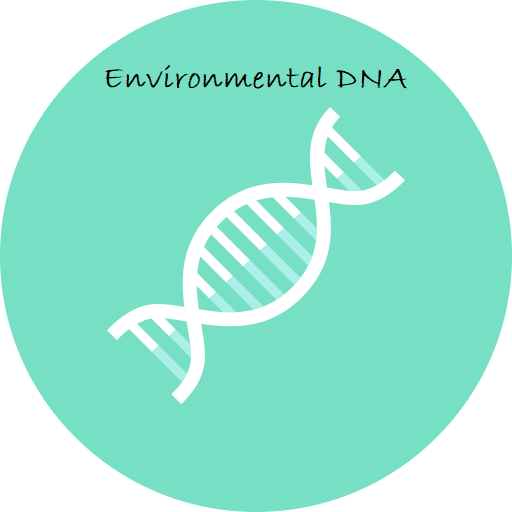
Symposium #72 Using environmental DNA (eDNA) as a non-invasive, cost-effective tool for rapidly measuring site biodiversity baselines and enabling efficient monitoring of change in habitat restoration initiatives. Organiser: Karma Bouazza
Environmental DNA (eDNA) is a rapidly emerging tool for remote rapid biodiversity monitoring, making large-scale biodiversity assessments more cost and time effective, and providing highly accurate repeatable results. eDNA is being used as a tool in prioritizing and planning ecological restoration activities, and then monitoring their results. The symposium will present how eDNA is being used in diverse contexts for conservation and ecological restoration in Australia, Kazakhstan, Lebanon, New Caledonia and UK, firstly assessing biodiversity at a species level, creating baselines, informing priority restoration activities, and then monitoring project results, while aiding global biodiversity assessments.
Lobby Lounge
DoubleTree Hilton
Workshop #71 People centered approach for integrated ecosystem and landscape restoration in Lebanon. Organiser: Abdo Nassar
Authors - presentors: Abdo Nassar (3), Joseph Bechara (1), Mireille Jazi (5), Sophie Mansour (4), Joelle Salameh (2)
Keywords: Stakeholder engagement; Gender Integration, Female Empowerment, Local Communities, Bio-Corridors, Forest Management, Reforestation, Community engagement, Fire Patrol, Firewise, Fireshed, Agroforestry, Sustainable Ecotourism and Youth Engagement.
Introduction
Knowing the value of people-centered approach for integrated ecosystem and landscape restoration, the proposed workshop will introduce various methodologies and initial findings from Lebanon, where an approach on developing a Social and Environmental Corridor (SEC) strategy will be introduced, highlighting the involvement of local communities with a focus on empowering women and youth in the sector. With ecological corridors connecting different species, fauna and flora, favoring the conservation and/or re-establishment of species in disturbed landscapes, the Lebanon Reforestation Initiative, through its scientific approach to restoration, will describe step by step the concept of the Social and Environmental Corridor strategy, where local communities are integrated in the center establishing successfully and sustainably corridor strategies. Moreover, the importance of an integrated and sustainable forest management planning approach that aligns national strategies with local initiatives will be shared and a case study on forest management will be presented, covering the planning, implementation phase with reflections on cost and ecosystem services. Detailed examples of successful activities that were planned and implemented under the SEC strategy will be introduced, specifically 1) the Fireshed and Firewise approach that has demonstrated to be efficient for improved fire risk management; 2) the creation of Eco Parks that plays a major role in engaging youth in conserving the restored lands and managing the natural resources; 3) the reforestation sector in Lebanon covering a research study for producing species suitability maps and adopted reforestation practices while engaging communities; 4) Agroforestry approach as a way to improve land use while engaging the private sector and 5) Role of international entities such USFS in empowering local environmental initiatives and creating network for knowledge exchange.
Darwin Room
DoubleTree Hilton.png)
Urban environments represent the key to unlocking global sustainability. They are a key interface between cultures, and incubators for interest in urban restoration. Better appreciating the cultural significance of urban biodiversity and opportunities to overcome social inequity via urban restoration activities that have strong foundations in indigenous culture is vital to restoration success in urban environments.
This symposium will take a holistic approach to addressing the challenges and benefits of urban restoration focusing on the following key topics:
- Urban design for restoration
- Restoring wildlife and managing pests in urban environments
- New tools for assessing the potential of urban restoration in helping human health
- Co-developing restoration approaches with indigenous groups for urban restoration outcomes
Join us for a related workshop on Wednesday afternoon to delve deeper into the challenges and opportunities of urban restoration.
Studio
Darwin Entertainment Centre
Workshop #31 Regenerative Creatives: building ecological awareness using art with nature and people. Organiser: Birut Zemits.
Gallery
Darwin Entertainment Centre
Ballroom A
DoubleTree Hilton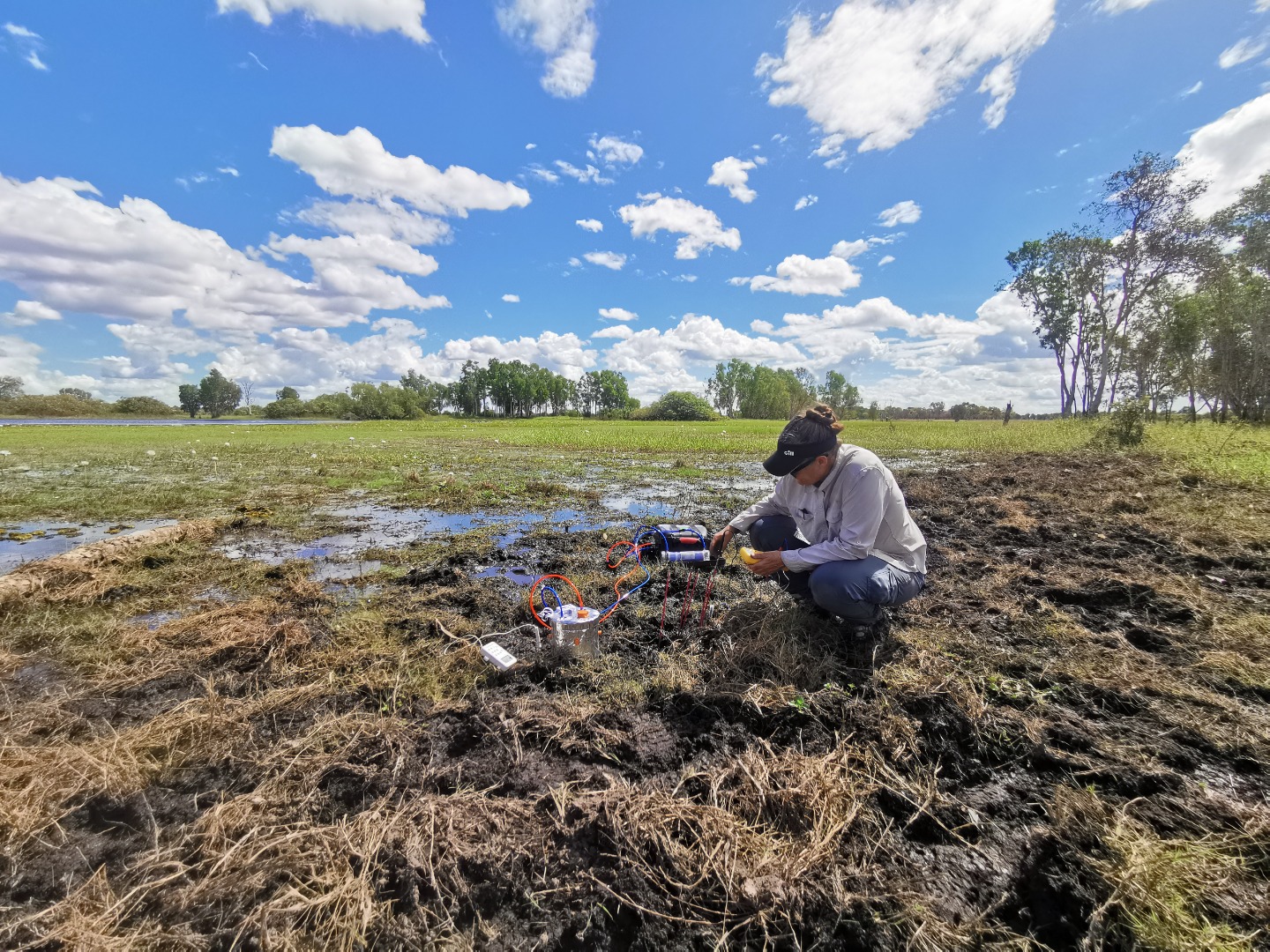
Symposium #36 Restoring coastal and floodplain wetlands by controlling feral ungulates – opportunities to incentivise restoration. Organiser: Valerie Hagger
Feral ungulates (e.g., cattle, pigs, buffalo) damage wetlands, reducing biodiversity, water quality and cultural heritage values. Feral ungulates may contribute to greenhouse gas emissions through their disturbance of soils and vegetation, but the levels of carbon abatement achieved with their control is not well characterised across Australia. Studies in wetlands in northern Australia have shown that removal of feral ungulates can increase vegetation cover, plant species richness, and recovery of rare species. Furthermore, visual indicators of wetland condition were found to match changes in more laborious invertebrate analysis and could be used as indicators of biodiversity change.
Despite the widespread damage feral ungulates cause, funding for management has been inadequate to address the problem. Many Traditional Owners undertake feral ungulate control programs and collect data on their impacts and effectiveness, but these activities are not well funded over large areas. To be effective, management of feral ungulates must be funded over extended periods, which requires novel approaches to financing the management of feral ungulates. Payments for carbon abatement and biodiversity enhancement by removing feral ungulates from wetlands may provide a stream of finance that could support long term management of feral ungulates.
This symposium will bring together scientists, Indigenous groups, and Traditional Owner groups undertaking feral ungulate control and characterising the benefits of feral ungulate control in wetlands in northern Australia. The aim is to share knowledge on successes, challenges, and benefits to underpin development of a new carbon restoration method, where payments for carbon credits and biodiversity enhancements would fund long-term management of feral ungulates, including on Indigenous lands.
Ballroom B
DoubleTree Hilton
Litchfield Room
DoubleTree Hilton
Step into the forefront of the global environmental and climate action movement with the UN Decade on Ecosystem Restoration Climate Challenge. The Climate Challenge is a core part of the UN Decade on Ecosystem Restoration Action Plan and open for new members! With the resounding call for collective action, we invite individuals and organizations dedicated to revitalizing our planet's ecosystems to join us.
The side event will be an open discussion session (1 hour) during lunch on Wednesday, 27 September 2023. This session will give a background into the goals and action plan of the Climate Challenge as well as kick-off the first in-person, global discussion on how to nurture and expand our collective action.
The first 20-min will be a verbal presentation that gives a big-picture of the many globally recognized restoration goals and explains how the Climate Challenge will contribute to these goals and the action plan. The next 40-min will be focused on fostering an open discussion between those interested in the Climate Challenge to:
- Network and Connect: Engage with like-minded changemakers, fostering collaborations that combine collective actions towards the same goal.
- Build a community: Nurture the growth of a united front as we discuss how individual efforts can contribute to a larger, transformational movement.
Who should attend? Conference participants interested in natural regeneration-based restoration approaches, UN Decade on Ecosystem Restoration partners and advisory committee, decision makers and representatives of government, companies and non-government organizations that are interested in promoting implementation and documenting cost-effective benefits of ANR.
The event is open to all delegates at the conference.
Co-host organizations: Conservation International, 20x20, AFR100, AFoCO, FAO, Global Rewilding Alliance, UNEP
Playhouse
Darwin Entertainment Centre.jpg)
Workshop #32 Achieving the vision of the UN Decade: Key capacity development initiatives to foster and enhance ecosystem restoration.
In 2022, a Capacity, Knowledge, and Learning Action Plan for the United Nations Decade on Ecosystem Restoration was developed by the FAO-led Task Force on Best Practices to address capacity gaps identified through a global assessment. The action plan proposes eight capacity development initiatives tailored to the needs of practitioners, professors and researchers, community groups, youth, policymakers, extension professionals, the finance sector and the private sector. It aims to achieve three main objectives: i) develop individual and organizational capacity across sectors and scales; ii) foster networks, partnerships and collective action mechanisms; and, iii) strengthen the enabling environment for ecosystem restoration. The workshop will present ongoing efforts and opportunities for collaboration in the implementation of the capacity development initiatives part of the action plan.
Playhouse
Darwin Entertainment Centre
A series of knowledge base and state of the art presentations from different regions followed by discussion based on the identification of needs, solutions and proposals for future work on implementationing and priorizing ecological restoration projects and examining practical means to incorporate the restorative continuum in actual policy priorities to achive UN Decade on ecosystem restoration goals.
Studio
Darwin Entertainment Centre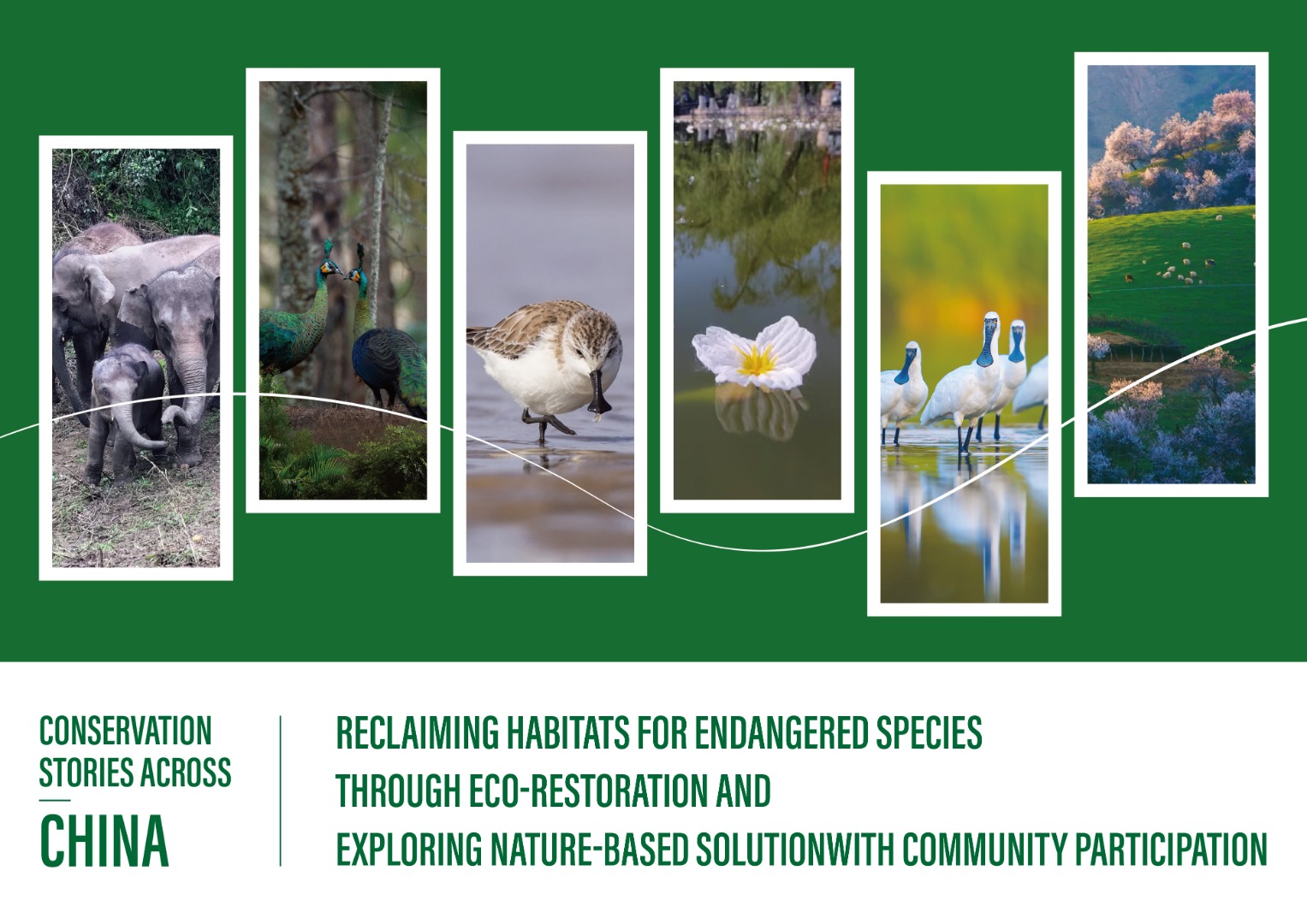
Symposium #10 Conservation Stories across China: Reclaiming habitats for endangered species through eco-restoration and Exploring nature-based solution with community participation. Organiser: Jin Xiao
Gallery
Darwin Entertainment Centre
Symposium #69 Management for scaling up ecological restoration with a socioeconomic outlook: A case study from Brazil. Organiser: Karina Cavalheiro Barbosa
Ballroom A
DoubleTree Hilton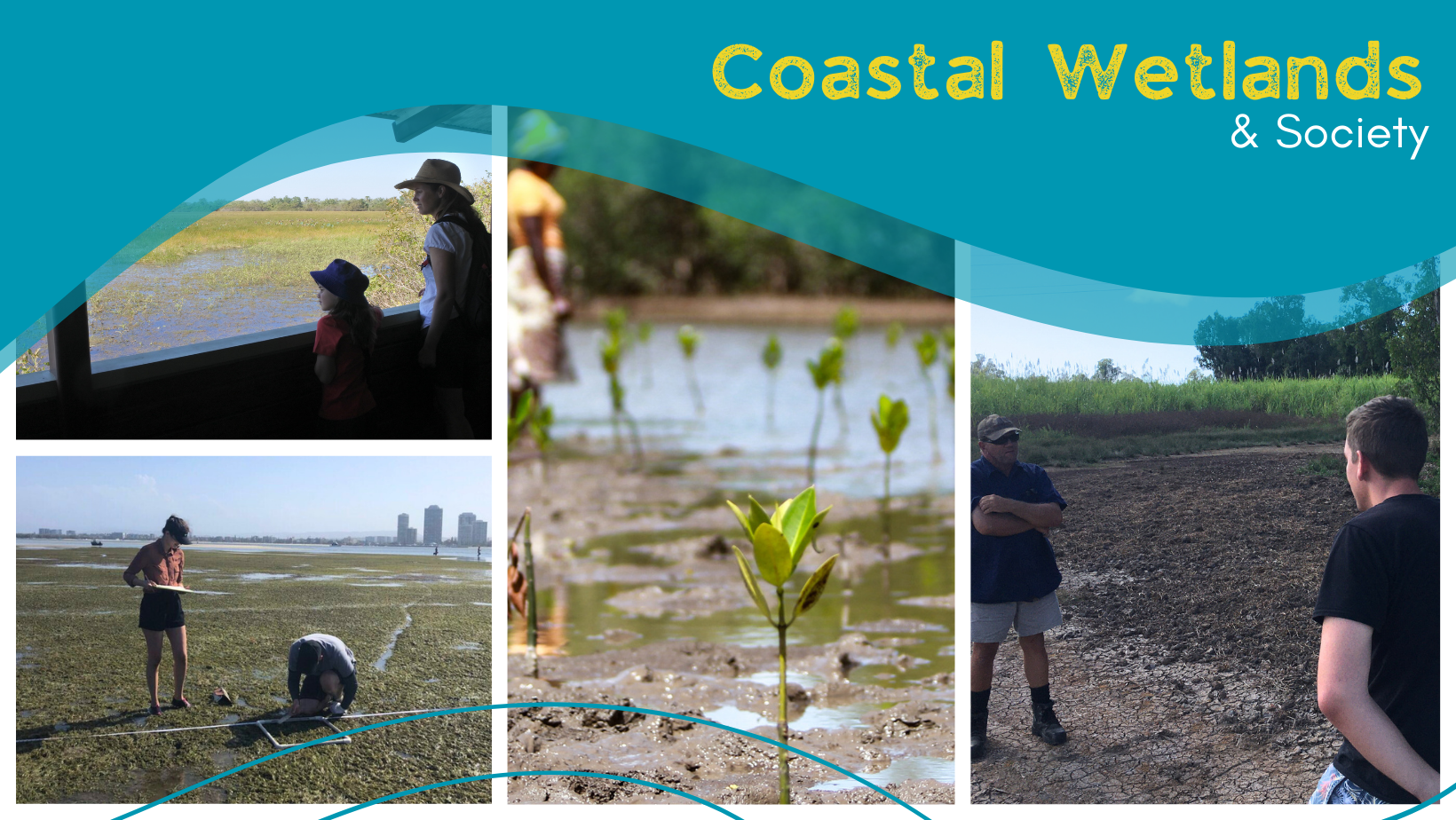
This breakout session explores the ecological and social dimensions of blue carbon projects, which are important for climate change mitigation, biodiversity, coastal protection, and human industry. Drawing on global case studies from Kenya, Mozambique and Australia, the speakers will highlight exciting new opportunities for protecting coastal wetlands and interrogate key factors underpinning the successful conservation and restoration of seagrass meadows, tidal marshes, mangrove forests, and supratidal swamps. This session aims to raise awareness of socio-cultural wetland values, demonstrate how community engagement can enhance restoration outcomes, and identify opportunities for blue carbon projects that benefit landholders and coastal communities. Those attending will be offered a new perspective on the conservation and restoration of coastal wetlands centred on those worst affected by their degradation and who will benefit most from their revival.
Ballroom B
DoubleTree Hilton
The importance of soil health and seed banks in the context of ecological restoration remains a critical area for academic discourse and applied research. This session seeks to advance our understanding of how various soil amendments, management practices, and the role of seed banks contribute to the restoration of degraded and disturbed landscapes. Through a confluence of case studies and empirical research, the session aims to provide insights into best practices and methodological approaches for soil health enhancement and effective utilisation of seed banks in restoration projects.
Kakadu Room
DoubleTree Hilton
Seeds are a key to ecological restoration whether they are naturally dispersed or used for hydroseeding or planting. It is thus essential to optimize their supply by the establishment of seed orchards whose production must be optimized but it is also the entire sector from collection to germination which must be. Mining activities lead to significant degradation of natural environments. Their restoration can be done passively through natural colonization or actively through the action of man who seeks to optimize it by developing innovative techniques. Whatever the case considered, a target vegetation must be achieved and it appears essential to put in place tools to monitor the evolution of the ecosystem. Such a survey will indicate the appropriate adjustments to be made to achieve the initial objectives.
All these aspects will be approached in several type of mine all around the world from open-cut coal mine in Australia, copper and gold mine in Papua New Guinea or in East Cameroun, nickel mine in New Caledonia, and European mines making restoration success the central point of all these works.
Litchfield Room
DoubleTree Hilton
Lobby Lounge
DoubleTree Hilton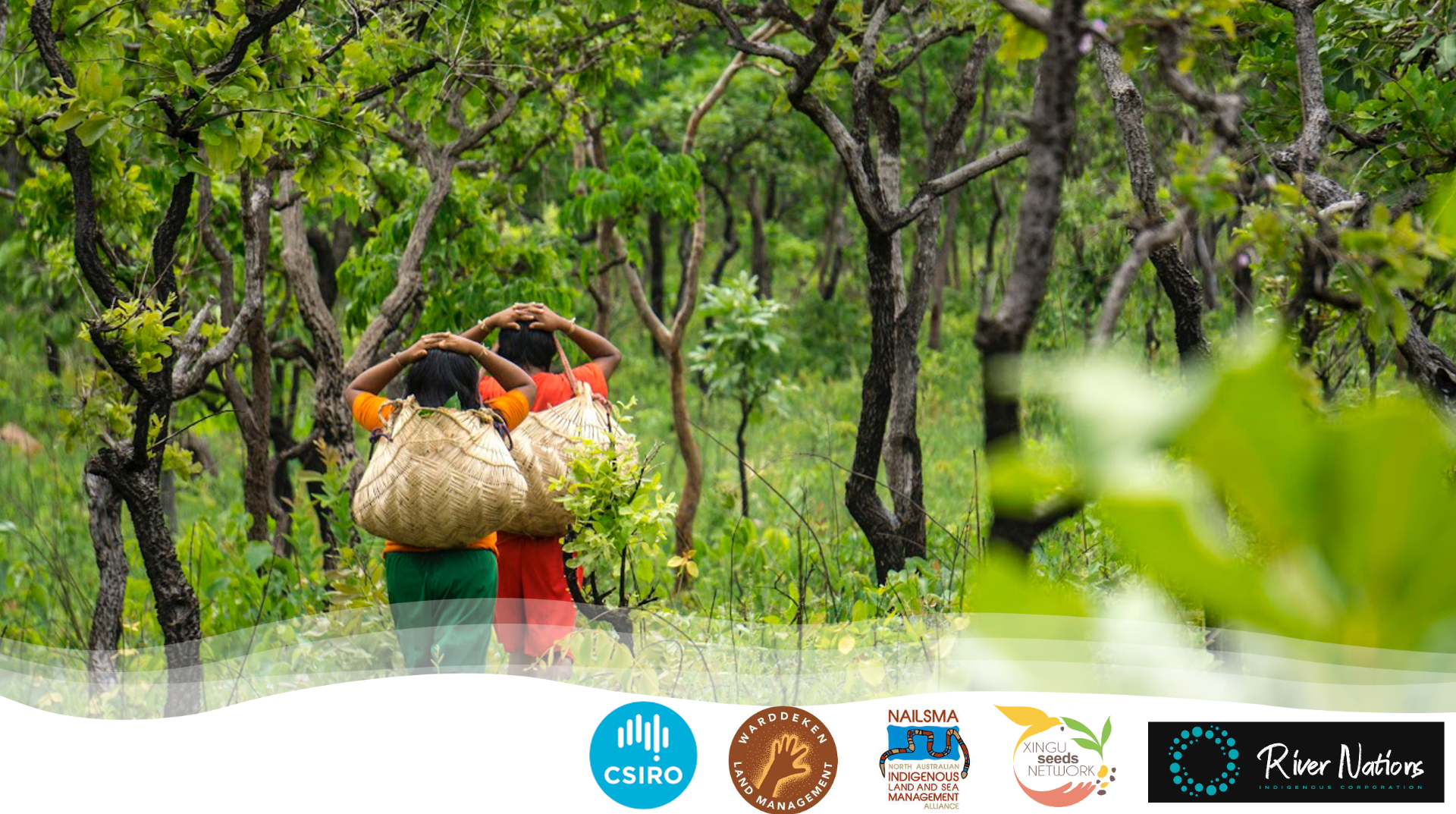
Workshop #96 Co-designing Indigenous-led supply chains for just restoration actions. Organisers: Danilo Urzedo and Cathy Robinson
Indigenous-led supply chains drive inclusive and innovative restoration practices that generate social, economic, and cultural benefits across the world. In this workshop, Indigenous organizations will showcase native plant material supply experiences from the Xingu Seed Network in the Brazilian Amazon, revegetation and koala monitoring actions from the River Nations Indigenous Corporation in Queensland, multiple benefits from savanna burning in the Warddeken Indigenous Protected Area in the Northern Territory, and integrated feral animal practices and economies supported by the North Australia Indigenous Land and Sea Management Alliance to facilitate reflections and discussions on transformative strategies towards equitable and just restoration supply chains.
Territory Room
DoubleTree Hilton
Workshop #2 Investing in The Future: Private Land Acquisition for Eco-restoration - challenges and opportunities. Organiser: Basil Schur
To Buy Or Not To Buy - That is the Question !
Gondwana Link (https://gondwanalink.org/) is an ambitious landscape scale conservation program across 1000km of southwestern WA, a global biodiversity hotspot.
Many properties have been bought for conservation and restoration focussing around the iconic Stirling Ranges. Outstanding progress has been made but the challenges are big
This participatory workshop is for celebrating achievements, learning about what works and sharing tips.
We want to hear from you !
Basil Schur ( Green Skills), Alex Hams (Bush Heritage Australia ) and Louise-Marlna Tarrier (Carbon Positive Australia) will provide brief introductions to the workshop topic.
This participatory workshop aims to explore the challenges and benefits of private acquisition of high conservation value properties as part of landscape scale projects. It will also highlight the major difficulties and opportunities associated with acquision in Gondwana Link and what has worked well. We will illustrate this with reference to various properties acquired for Gondwana Link including the Tootanellup bought by Green Skills for eco restoration ( https://www.youtube.com/watch?v=zhR9VjVLV_c ) and Ediegarrup by Bush Heritage Australia
Darwin Room
DoubleTree Hilton
UN Decade Flagship Pavilion - The Bamboo Village Trust Fund: Restoring Ecosystems Through Village-based Bamboo Agroforestry Champions. Organiser: Arief Rabik
Playhouse
Darwin Entertainment Centre
Symposium #117 Trinational Atlantic Forest Pact UN Restoration Flagship: integrated outcomes to the UN Decade on Ecosystem Restoration. Organiser: Taruhim Quadros & Alex Mendes
Studio
Darwin Entertainment Centre
Gallery
Darwin Entertainment Centre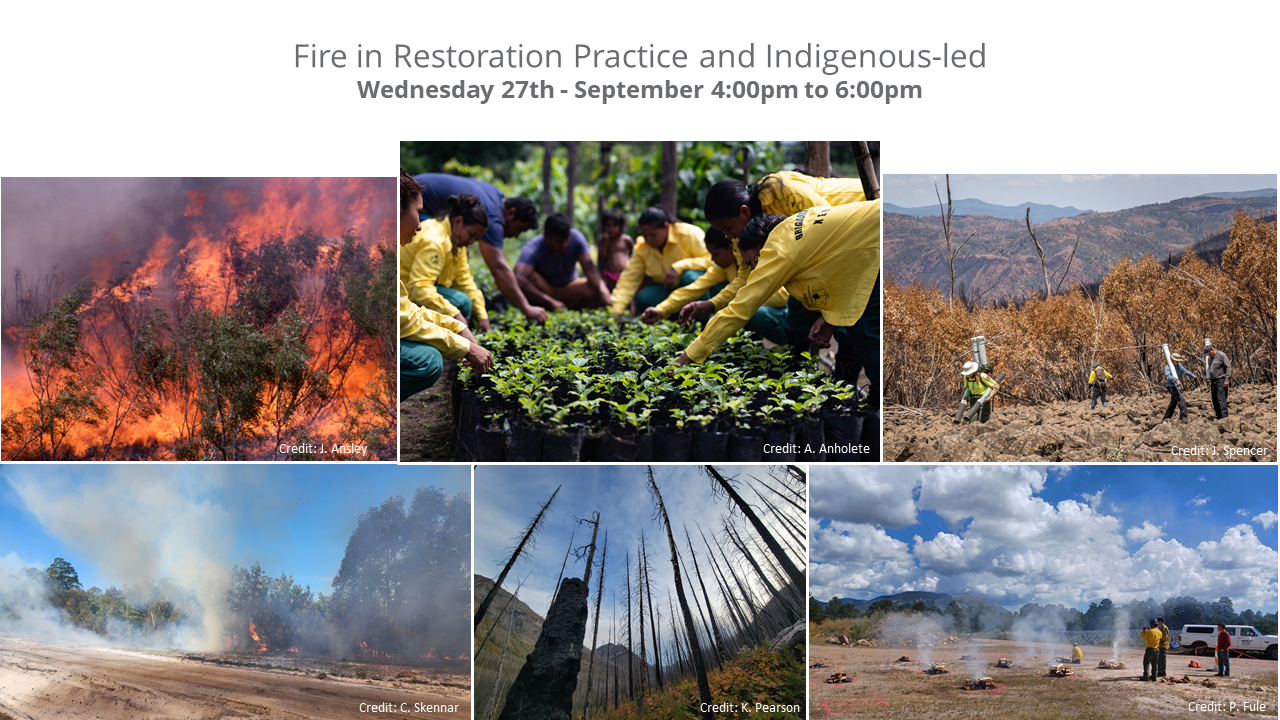
Fire presents challenges but also opportunities for ecological restoration. This session provides a comprehensive global perspective, emphasizing the divergent impacts of managed and unmanaged fire. Evolving practices and knowledge have elevated fire's role in landscape restoration. Placed in the context of traditional ecological knowledge and practice, fire contributes to restoring biodiverse and cultural landscapes. Conversely, the escalating frequency of severe wildfires across diverse biomes impacts not only ecological outcomes of our restoration efforts, but also the people who do the restoration work.
Ballroom A
DoubleTree HiltonSymposium #29 Adaptive habitat management in a changing climate: challenges in the ecological and cultural restoration of coastal wetlands in regions vulnerable to drought conditions. Organiser: Anna Armitage
Ballroom B
DoubleTree Hilton
Symposium #95 Soil microbial communities are 'first responders' in the restoration of drylands and savannas. Organiser: Wendy Williams
Deserts, semi-arid and monsoonal rangelands and savannas rely on capturing rainfall and nutrient resources during windows of opportunity. Contributing to resource capture are communities of mostly microscopic organisms that create protective structures at the interface of soil and atmosphere. Phototrophs (cyanobacteria, lichens, algae, liverworts, mosses) interact with heterotrophs (bacteria, fungi) in biodiverse communities in the upper millimetres of soil, forming biocrusts. Biocrusts fix nitrogen (N) and carbon (C), cycle nutrients, stabilise soil and assist rainfall infiltration.
Kakadu Room
DoubleTree Hilton
Litchfield Room
DoubleTree Hilton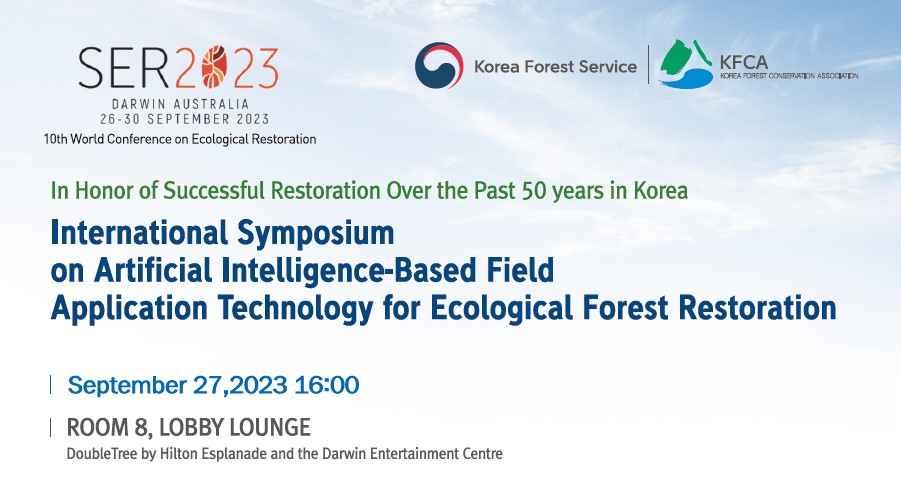
Symposium #19 International Symposium on Artificial Intelligence-Based Field Application Technology for Ecological Forest Restoration (On Wed 27). Organiser: Jungeun Song
Chairman: Changseok Lee
Over the past half century, Korea has emerged as the only country in the world to succeed in reforestation, and is now seeking a vision for the next 100 years of forestry.
The Korea Forest Service is working to develop professional technologies to support and establish a policy foundation for expanding and developing forest restoration into new business areas.
This international symposium was held as a special session at the World Society for Ecological Restoration in Darwin, Australia, a city rebuilt from two ruins.
To commemorate the 50th anniversary of Korea's land afforestation, we plan to share our country's forest restoration achievements and the development and practicalization strategies of cutting-edge technologies for ecological forest restoration.
The symposium will consist of topic presentations and discussions by domestic and foreign experts on the Korea Forest Service's policy technology trends for ecological forest restoration, forecasting and evaluation techniques for carrying out forest restoration projects, and international programs.
Lobby Lounge
DoubleTree Hilton.png)
Workshop #103 Urban Restoration: challenges and benefits of urban restoration, and paths forward toward sustainable city living. Organiser: Rachel Nepia
Urban restoration is a topic of increasing interest globally because of the growing challenges of urban living, and the benefits that come from nature thriving in urban centres. This workshop follows on from the ‘Urban Restoration’ symposium to facilitate deeper drilling into the future of urban restoration, and paths forward toward sustainable city living. SER 2023 represents a unique opportunity to harness the collective power of a global network of restoration researchers, practitioners, and policy makers. In this workshop we will work together to generate cross-sectional understanding of knowledge gaps, future perspectives, opportunities, and challenges of urban restoration.
Help us out with some pre-workshop background info by filling in this form: https://forms.gle/1QTgbiPYXVAACYDu7.
The workshop will begin with an introduction by Martin Breed (Flinders University). We will then break into four discussion groups based on four themes:
- Biodiversity – with Stephen Hartley and Bruce Clarkson
- Human health – with Craig Liddicoat and Martin Breed
- Indigenous-led restoration – with Erana Walker, Sera Gibson and Wiremu Puke
- Designing biodiverse urban areas – with Yolanda van Heezik and Kiri Wallace
The group discussions will focus on challenges and opportunities for urban research, exploring what we know now, What we would like to know, and any key examples or case studies that relate. We will then take a short break, before resuming to combine the findings of each of the discussion groups and collect feedback.
The aim of the workshop is to produce a publication highlighting cross-sectional understanding of opportunities and challenges of urban restoration from a global audience, as well as a horizon scan forward of opportunities and challenges for restoration in urban environments. If you are interested in being part of the writing process for this publication, please contact our Programme Manager, Rachel Nepia at peoplecitiesnature@gmail.com.
Darwin Room
DoubleTree Hilton
Ballroom A
DoubleTree Hilton
Ballroom B
DoubleTree Hilton
Kakadu Room
DoubleTree Hilton
Litchfield Room
DoubleTree Hilton
Join the Royal Commission for AlUla for an evening highlighting the Commissions ambitious plans for nature conservation in AlUla, Saudi Arabia. The Royal Commission for AlUla was established to protect and safeguard AlUla, a region of outstanding natural and cultural significance with stunning landscapes and wildlife.
The evening’s talks and film will cover aspects such as the Commission’s large-scale ecosystem restoration goals and methods, species reintroductions such as the Arabian Leopard and, the Commission’s aspirations regarding eco-tourism and sustainable development. The evening will consist of talks, a short film and Q+A with drinks and canapés to be served. 27th September 2023, 7-9pm. Room 8 Lobby Lounge.
Lobby Lounge
DoubleTree Hilton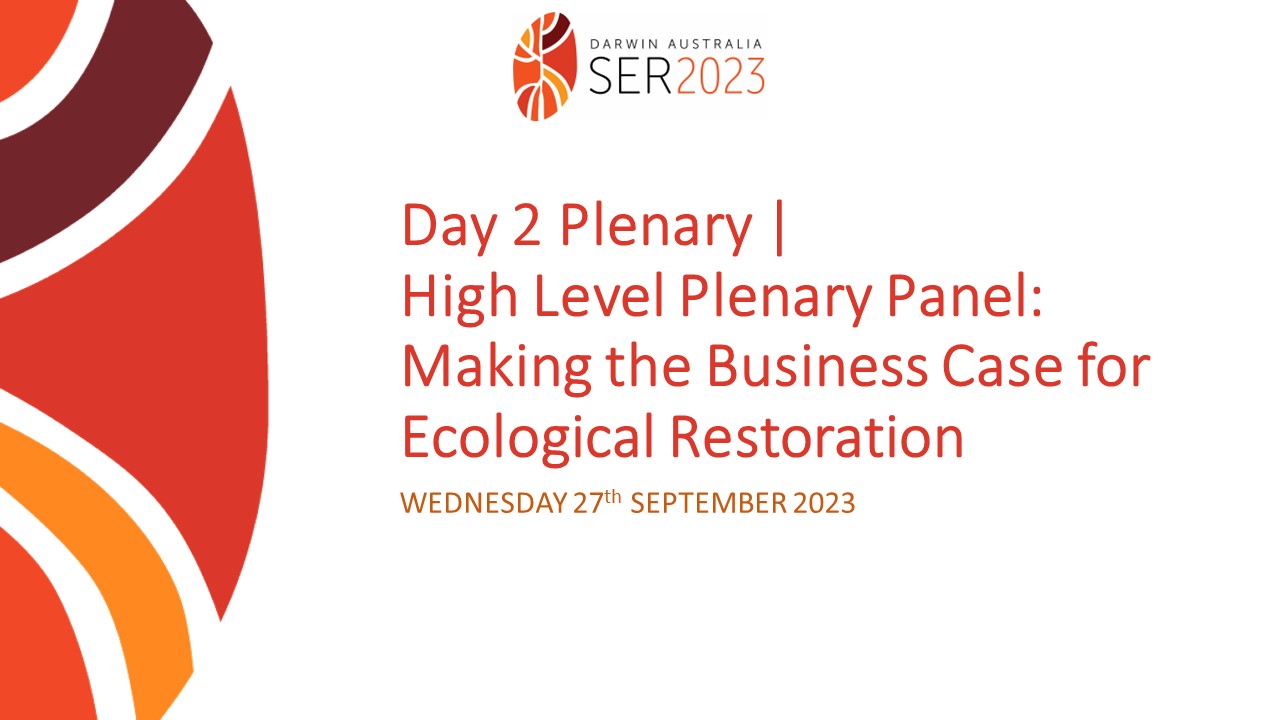
Playhouse
Darwin Entertainment Centre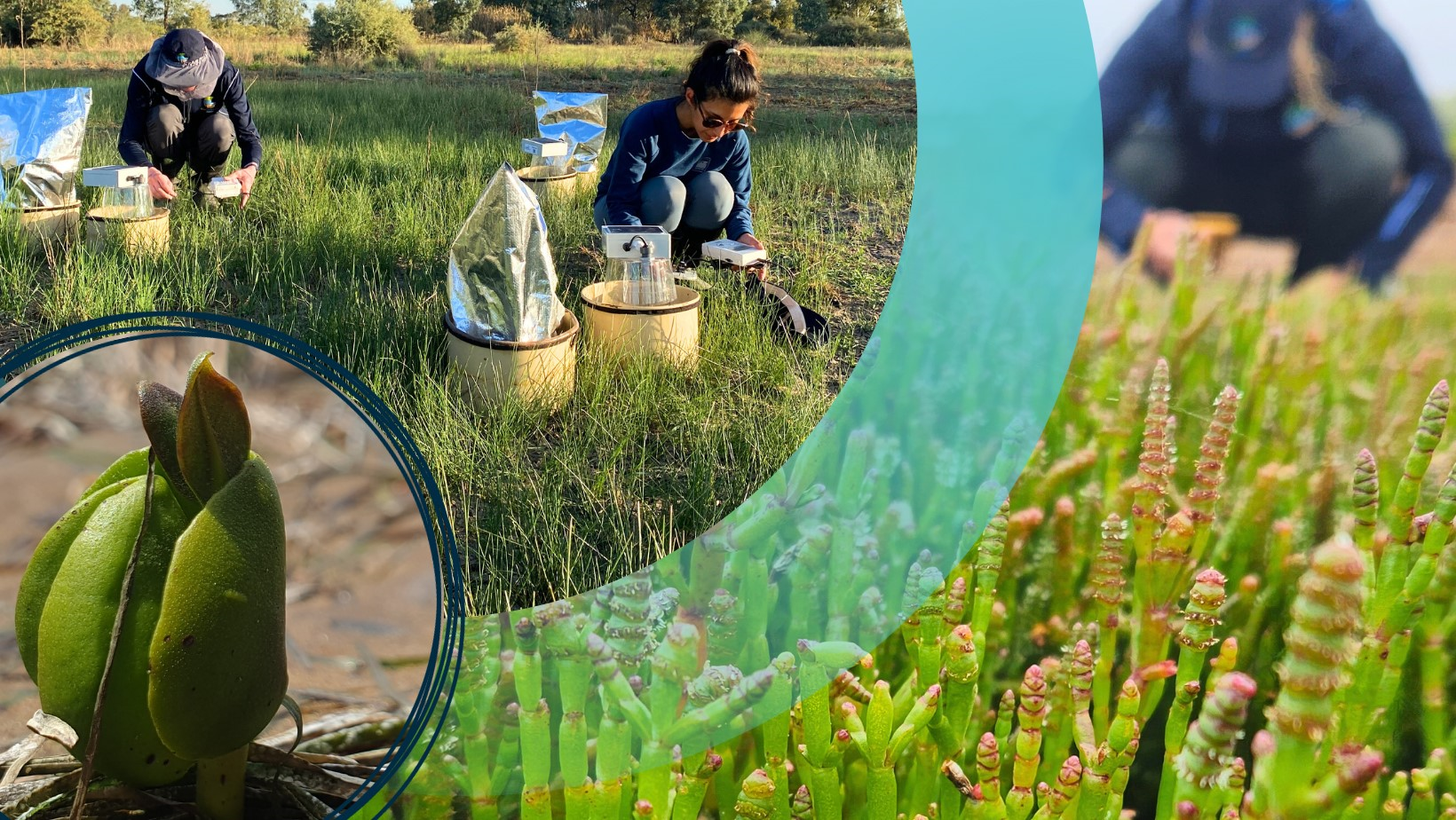
Symposium #60 Blue and teal carbon ecosystems as a nature-based solution to climate change. Organiser: Stacey Trevathan-Tackett.
Please join us on Thursday morning for our symposium on wetland restoration as a Nature-based Solution to climate change. Our speakers will present on a range of restoration research from both freshwater and coastal wetlands. Topics will include site- and landscape-scale restoration activities, as well as a global-scale freshwater wetland meta-analysis. We will discuss short-to-long-term outcomes of wetland recovery, while also identifying the decisions that go into restoration projects and the opportunities for future restoration of these invaluable ecosystems.
Ballroom B
DoubleTree Hilton
Symposium #76 New approaches for data integration to prioritize restoration projects. Organiser: Andres Felipe Suarez Castro.
Kakadu Room
DoubleTree Hilton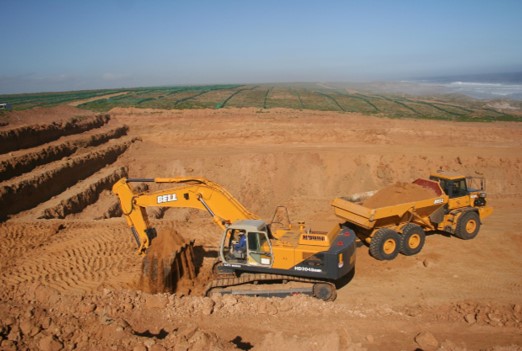
Symposium #38 New Guidance: The SER International Principles and Standards for the Ecological Restoration and Recovery of Mine Sites. Organiser: Renee Young.
Mining is one of the world’s largest contributors to the global economy contributing US$544.4 billion in 2020, yet the process of mine site restoration that achieves relinquishment is a challenge felt across the industry. As a part of the closure process, mining companies are often required to return or transfer land impacted by their activities in a condition that is suitable for the next agreed upon land use. In many cases this is the same general land use that was present prior to disturbance, and often consists of a native ecosystem. In these instances, ecological restoration approaches are required.
The SER International Principles and Standards for the Ecological Restoration and Recovery of Mine Sites present a robust framework for delivering high-quality ecological restoration of mine sites. They highlight the role that mine site restoration has in connecting industry with social, community, and ecological productivity; as well as providing recommended performance measures.
As a standalone industry, mining is well positioned, if an expanded commitment to ecological restoration were made, to reinstate impacted biodiversity values and ecosystem services, and support commitments to human wellbeing and traditional uses of the land. In this special symposium and high-level panel, we examine the document and draw on case studies to demonstrate how the principles are in use around the world. We explore options to demonstrate how industry and government can use these standards within existing internal and external processes to address mining-specific challenges, minimise the recovery gap and move towards net gain. Concluding the session is a high-level panel to discuss the ability of the SER Mine Site Restoration Standards to be the bridge for successful mining transitions.
Litchfield Room
DoubleTree Hilton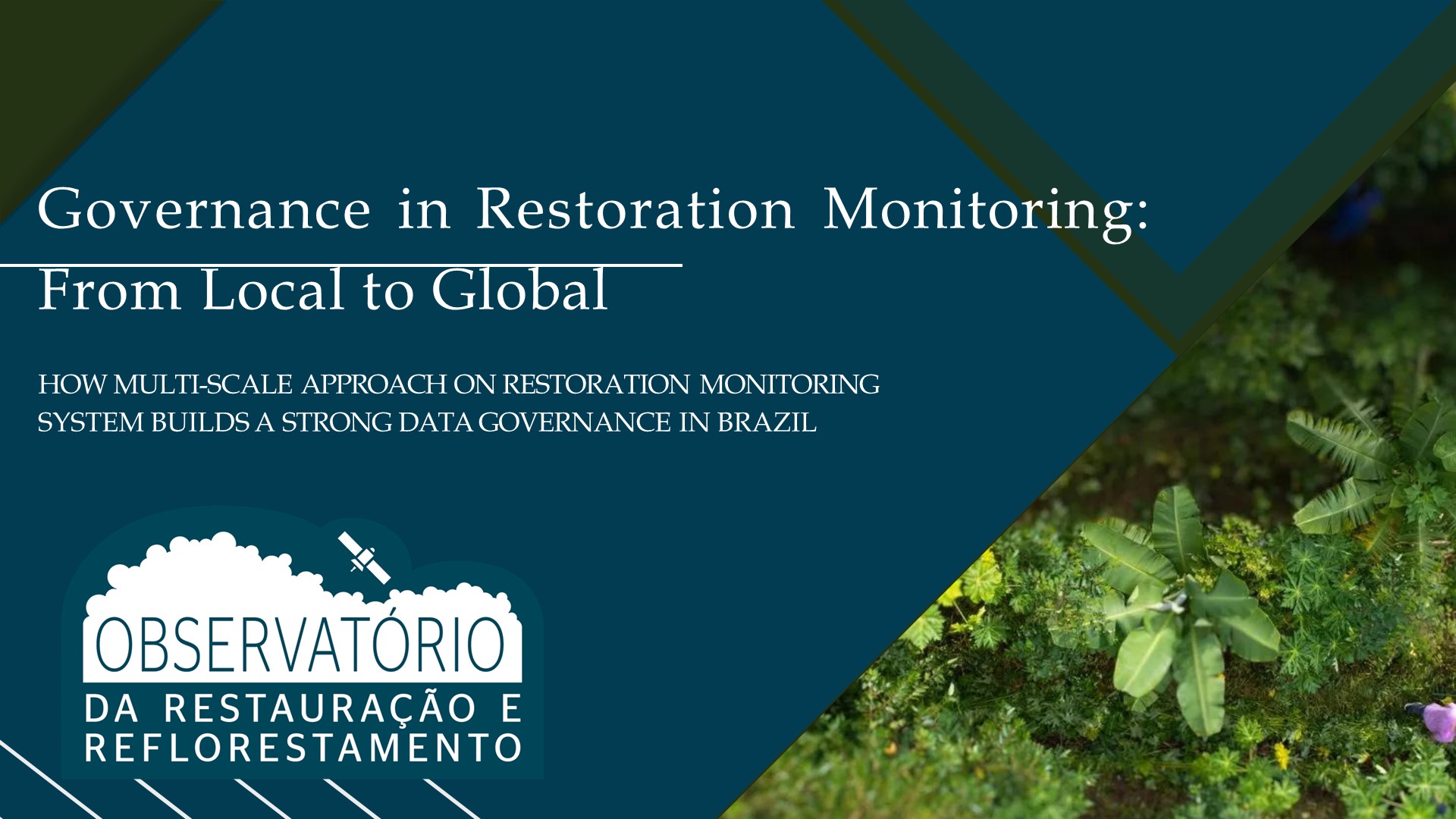
Symposium #35 Governance in Restoration Monitoring: From Local to Global. Organiser: Tainah Godoy and Cézar Borges.
The goal of this symposium is to debate a monitoring data governance that encompasses regional, national and global scales, using reliable data. For this, we present the Restoration and Reforestation Observatory platform, an initiative hosted by the Brazil Coalition for Climate, Forests and Agriculture. We will discuss the integration of several monitoring initiatives in different scales of coverage and sources, highlighting the potential benefits and challenges of this spatial approach coupled with on-ground data collection and validation.The guests are representatives of monitoring platforms such as Restor, Araticum, Pacto, and Aliança.
Lobby Lounge
DoubleTree Hilton
Workshop #86 Design Futuring for Ecological Restoration: Using Design Methods for Analysis and Creative Reframing in Restoration Projects. Organiser: Madeline Sides.
Are restorationists historians, futurists, or a bit of both? This workshop will make the case for considering ecological restoration as a design futuring activity. In the workshop, restorationists will learn two useful methods from design research and futures studies that can help manage the delicate socio-technical-ecological complexity of their work.
Through a group activity, we will link together one analytical method from futures and foresight studies: the Causal Layered Analysis (1), and one generative method from design research: New Metaphors (2).
Participants will quickly learn and then apply CLA to identify the systemic factors, core metaphors and fundamental stories at the heart of restoration work, including the limitations of these “old metaphors”. We will then try to re-imagine these “old metaphors” through using the creative process toolkit known as New Metaphors. By identifying, critiquing and reframing the core metaphors that may be enabling or hindering ecological restoration work, restorationists will gain a new method in their toolbox for approaching complexity and ecological change.
This workshop will introduce just two of the many methods and frameworks from design research and futures studies that can be applied to ecological restoration challenges. Practitioners will leave with two new analytical and creative methods relevant to some aspect of their restoration work. The workshop will also aim to seed curiosity in the restoration community for greater engagement with design research and practice.
Darwin Room
DoubleTree Hilton
Territory Room
DoubleTree Hilton
Symposia #28 Towards a National Restoration Plan: co-designing Australia’s ecosystem restoration targets. Organiser: Kristin Den Exter.
Playhouse
Darwin Entertainment Centre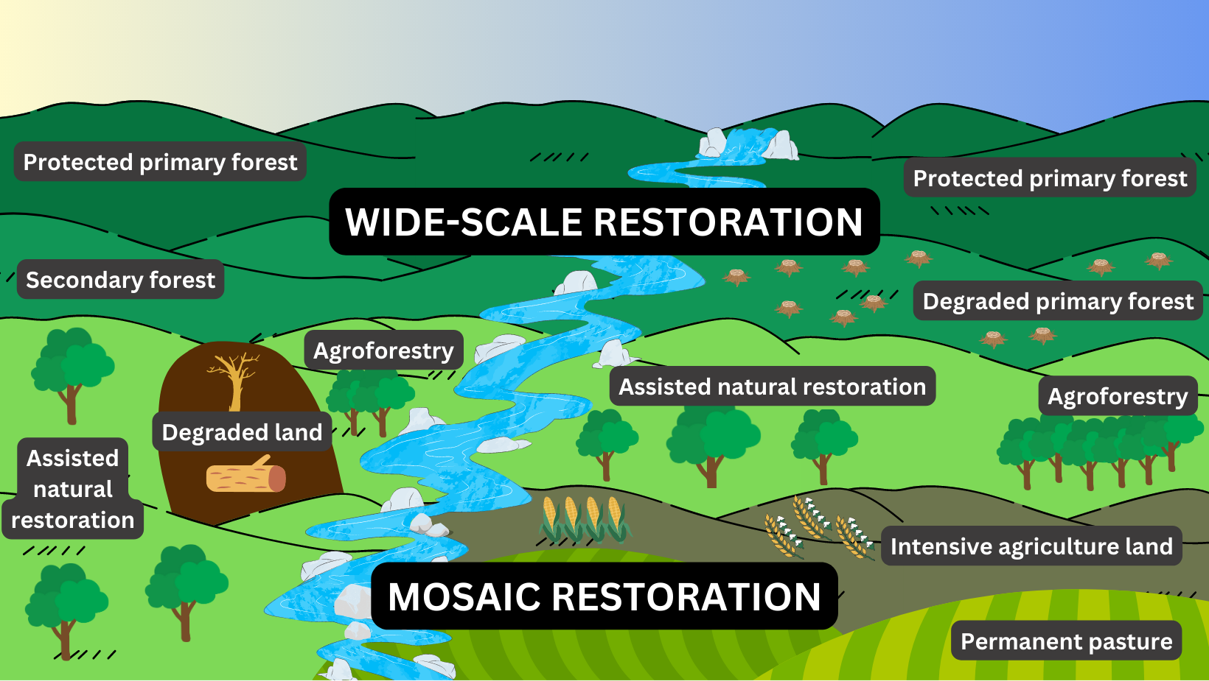
Symposium #92 FLR in Africa Initiative: Enhancing landscape restoration implementation across Africa. Organiser: Severin Kalonga.
FLR in Africa Initiative: Enhancing landscape restoration implementation across Africa
Thematic of the session: Integration across scales Restoration in Practice
Landscape restoration is a global agenda under the Bonn Challenge. The African Forest Landscape Initiative (AFR100) is the continental vehicle to restore 100 million hectares of degraded land and deforested landscapes in Africa by 2030. Forest and landscape restoration (FLR) are among those processes that apply to reversing land degradation, forests and agricultural areas, thereby regaining their ecological functionality at landscape level to achieve multiple benefits. The AFR100 reports a total of 34 countries which have already committed to restore 129.5 million of degraded lands and deforested landscapes by 2030. However, it has been evident that the implementation of such commitments has been very slow. Among the key challenges include limited knowledge of the concept of forest landscape among practitioners, inadequate technical capacity and information.
This session will be used to communicate practical experience and knowledge in mitigating prevailing challenges which will enhance and accelerate restoration on the ground at scale.
Studio
Darwin Entertainment Centre
Symposium #118 Cultural keystone Iinnii (Bison) Rematriation revitalizes and restores ecologically and culturally significant Kainai grasslands. Organiser: Kansie Fox.
Gallery
Darwin Entertainment Centre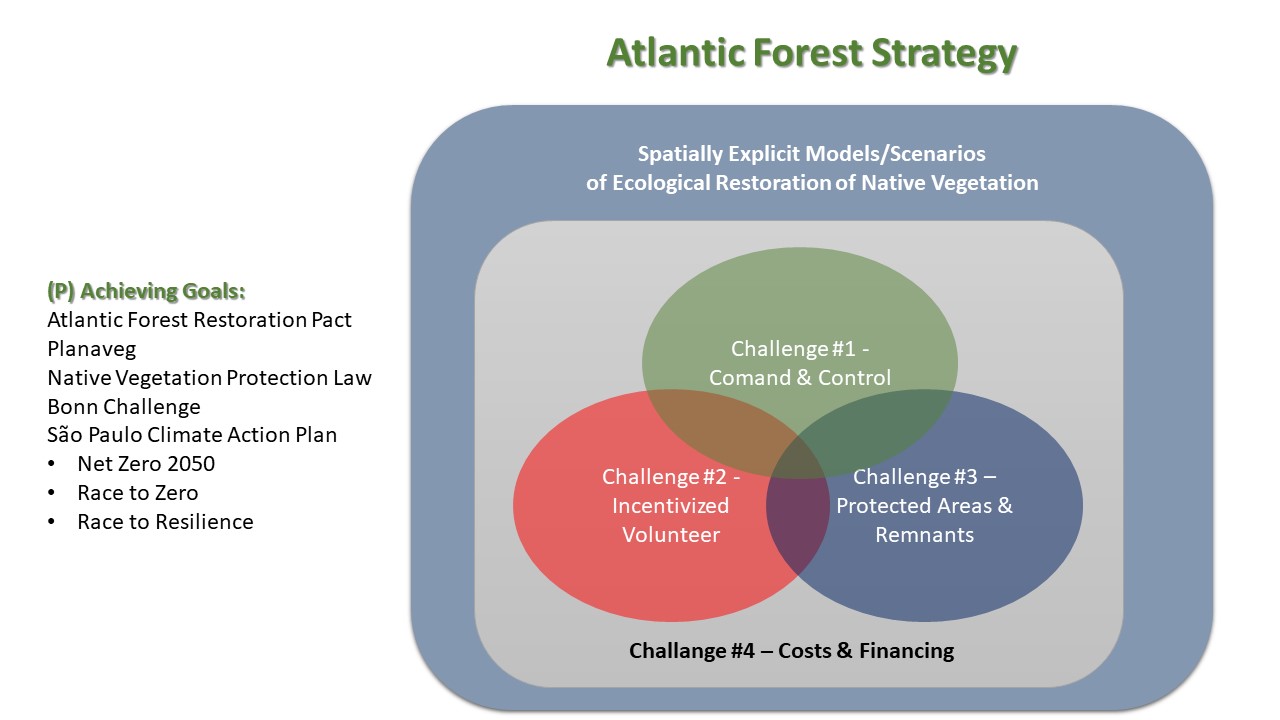
Symposium #16 Institutional challenges and arrangements that allowed the implementation of large scale restoration in tropical forests - Opportunities and consequences for public policies. Organiser: Paulo Guilherme Molin.
Increasing Forest cover through the ecological restoration of terrestrial ecosystems has been the most promising strategy for achieving global goals aimed at mitigating climate change and resuming the various ecosystem services promoted by forests. The Brazilian Atlantic Forest revealed thousands of hectares of forest recovery in the last 30 years, most of which are the result of land abandonment and natural regeneration. However, some of the restored sites are consequences of important and successful stakeholders (public companies, NGO’s, governments) with ambitious large-scale restoration initiatives. This symposium will present and discuss how different institutional arrangements are organized, their specific objectives and performance over the years, as well as opportunities and consequences for public policies. A sum up will close the symposium, integrating how large research proposals have teamed up with these stakeholders to create better large-scale and spatially explicit strategies and enrich public policies to implement restoration for different ambitious goals. We consider that these arrangements can serve as strategic models for other tropical biomes and arrangements that aim for the UN decade of restoration.
Ballroom A
DoubleTree Hilton
Lobby Lounge
DoubleTree Hilton
Studio
Darwin Entertainment Centre
Introducing the GEF8 Ecosystem Restoration Integrated Programme: A Transformative Portfolio of 20 Countries with Global Impact.
CI was officially confirmed as the Lead Agency for the Ecosystem Restoration Integrated Programme (IP) under the Global Environment Facility’s GEF8 Programming Directions in December 2022. With 20 countries across the globe in the Programme, each implementing their own innovative restoration projects, through the Global Coordination Project (GCP) CI will serve as the aggregating force to oversee, coordinate, and harmonize those 20 Country Projects (Angola, Brazil, Cambodia, Chad, Congo DR, Cote d'Ivoire, Haiti, Madagascar, Mali, Mauritania, Mexico, Mozambique, Nepal, Peru, Rwanda, Sao Tome and Principe, Sierra Leone, South Africa, Uzbekistan, Vietnam).
The side event will be an open discussion session (1 hour, 12:45 to 1:45 pm) during lunch on Thursday, 28 September 2023. The session will provide key information on and insight into the GEF8 Ecosystem Restoration Integrated Programme as well as create a space to kick-off interesting conversations about scaling, amplifying, and supporting the diverse impacts of the GEF8 ERIP.
The first 30-min will be a presentation from the Conservation International Global Coordination Unit (GCU), which will include
- an overview of key background information on the ERIP, including the countries in the Programme,
- an update on our current progress,
- a short presentation of our Results Framework (which lays out the outputs, outcome, and activities through which we hope to implement the GCP),
- areas of collaboration with other restoration actors.
The second half of the session will consist of Q&A and discussion focusing on potential contributions and innovations from the programme to the broader global restoration community.
Who should attend? The global restoration community and practitioners, SER2023 participants interested in learning about our restoration portfolio, ministers/government representatives, private sector, international organizations (environmental, women, indigenous, youth, etc.).
The event is open to all delegates at the conference
Kakadu Room
DoubleTree Hilton
Symposium #90 Attracting private sector investments to unlock smallholder producers’ access to sustainable finance for large scale implementation of the AFR100 Initiative. Organiser: Mamadou Diakhite.
Studio
Darwin Entertainment Centre
Symposia #85 High quality forest landscape restoration accelerated by global corporate sector investments. Organiser: Daniel Arrifano Venturi.
There is an urgent need for corporate leaders to set and meet rigorous nature and climate targets by investing in high-integrity and nature-based solutions. To that end, WWF has been actively engaging with companies to set a new, high bar for leadership on nature, people, and climate, by supporting high quality Forest Landscape Restoration efforts across the globe.
Forest Landscape Restoration goes beyond on-the-ground actions by including activities that are essential for the long term persistence of the forest landscape restoration impacts, such as connecting global, national, and regional restoration goals, strengthening local forest restoration networks, advocating for enabling policy conditions, and promoting co-investments (including private and blended finance).
Through global private sector engagement platforms, like the Forests Forward Program, WWF is driving real, lasting impacts in important forest landscapes, including the Atlantic Forest (Brazil), Madre de Dios (Peru), and the Forests of Eastern Australia. The experience of the on-the-ground work under implementation in these three priority landscapes is providing valuable contributions, lessons learned inspiring us and our partners to build financial mechanisms and strong corporate partnerships to scale Forest Landscape Restoration globally.
Engaging the private sector to support high quality Forest landscape Restoration is a crucial strategy to achieve the ambitious goals and opportunities set for the UN Decade on Ecosystem Restoration.
Playhouse
Darwin Entertainment Centre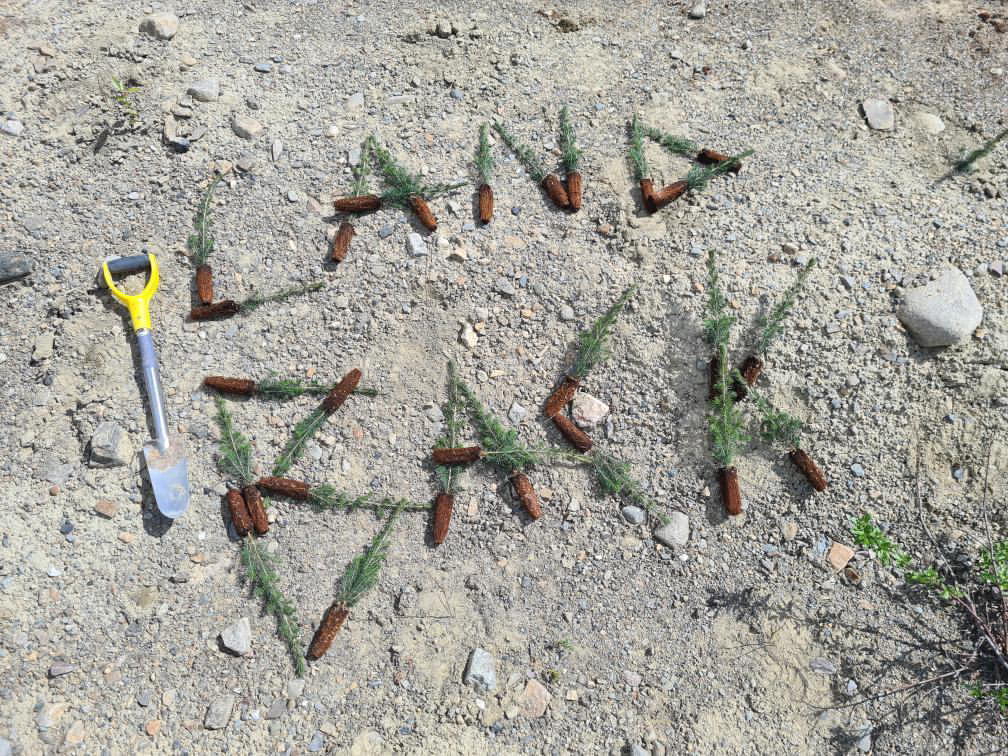
Symposium #97 Anti-colonial mine site reclamation, restoration and land guardianship in northern Canada. Organiser: Krystal Isbister.
This symposium features speakers from Indigenous-led reclamation projects in northern Canada and Australia to center and celebrate the on-the-ground, layered work of decolonization, self-determination, guardianship and reclamation, with the aim of creating cultural resurgence via restoration.
Gallery
Darwin Entertainment Centre
Symposium #66 Economic chain of forest restoration: the experience of Doce river Basin in southeast Brazil. Organiser: Leandro Luiz Ferreira Abrahão.
Ballroom A
DoubleTree Hilton
Symposium #22 Coastal wetland restoration – quantifying and regulating the provision of co-benefits. Organiser: Justine Bell-james.
Coastal wetlands across the globe have been subject to significant degradation and loss, and there is a pressing need to invest in widespread restoration of these critically important ecosystems. Progress in this space has lagged behind terrestrial environments for a multitude of reasons including costs and legal and policy barriers.
In many countries the tide is turning, and interest in coastal wetland restoration is increasing. For example in Australia, the recently released Blue Carbon methodology has paved the way for rapid uptake of restoration projects with a clear financial benefit through the generation of carbon credits. The Nature Repair Market will provide another clear financial incentive for investors to restore coastal environments.
To achieve coastal wetland restoration at scale though, there is a need to accurately measure and quantify co-benefits (additional to carbon sequestration) provided by projects and ensure that there is legal and policy machinery in place to secure these rights. Economic feasibility assessments have shown that in many cases coastal wetland restoration would not be profitable under carbon markets, because payments from carbon abatement alone are not sufficient to outcompete agricultural production. Furthermore, in the long-term money from offsetting emissions should diminish as the world moves towards net zero. Therefore, restoration projects need to consider alternative sources of funding, such as payments for other ecosystem services. Quantification and economic valuation of coastal wetlands for biodiversity, fisheries and coastal protection benefits can provide the evidence to finance restoration projects under other markets, such as the emerging biodiversity market.
This symposia will explore these issues through a multi-disciplinary lens involving science, law and policy, and bring together researchers from Australia, Vietnam and Papua New Guinea.
Ballroom B
DoubleTree Hilton
Kakadu Room
DoubleTree Hilton
Litchfield Room
DoubleTree Hilton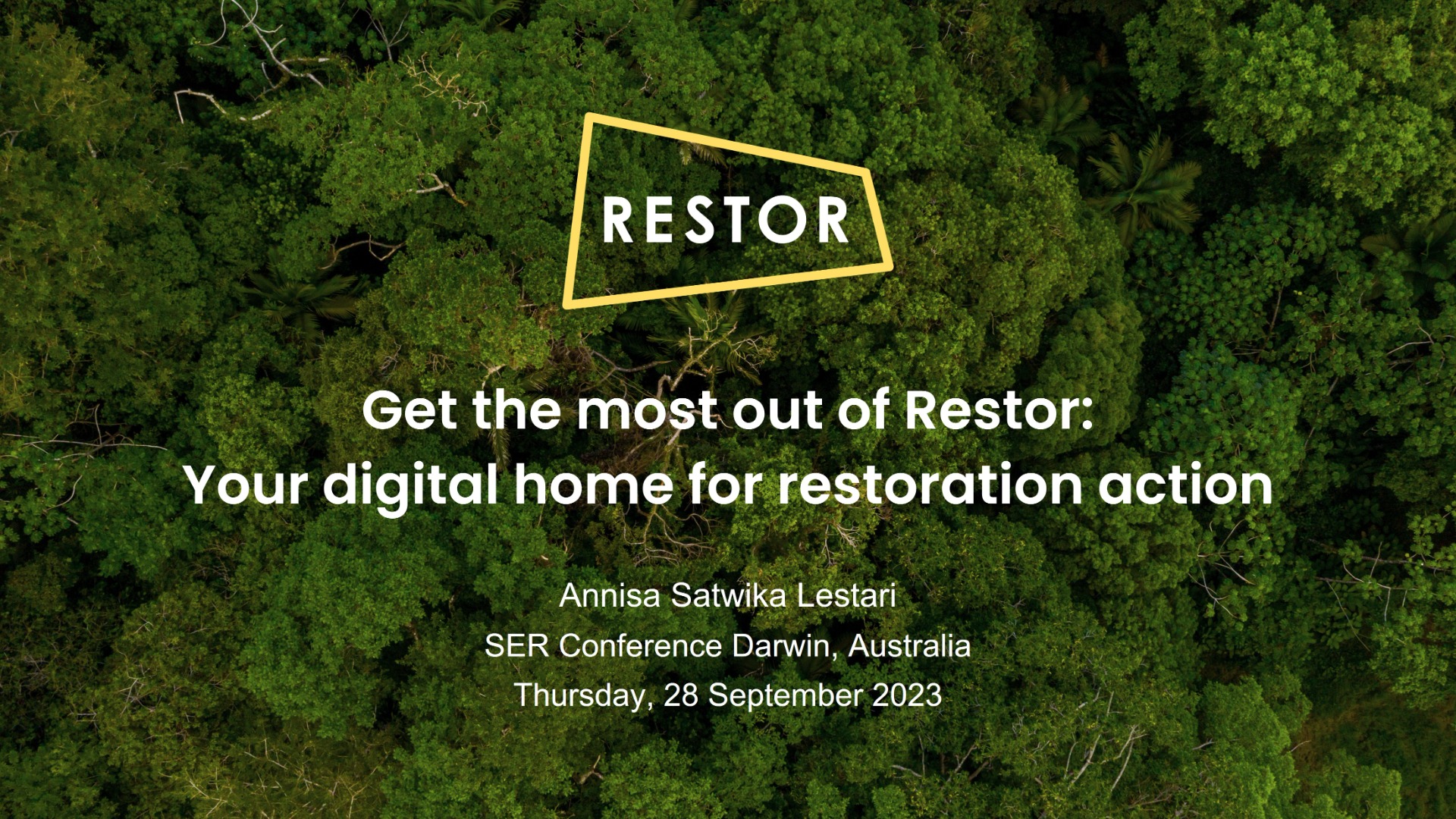
Workshop #75 Get the most out of Restor: Your digital home for restoration action. Organiser: Simeon Max
Restor is a new science-based open data platform to bring online the global restoration movement. Our goal is to enable and accelerate nature restoration and conservation around the world. Connecting everyone on one digital platform helps facilitate the exchange of resources within the network such as funding, monitoring tools or restoration knowledge. The objectives of this workshop are
(1) to assist the audience in setting themselves up on Restor
(2) to make the audience familiar with the benefits and use cases of Restor so that they understand how and which restoration challenges Restor can help solve;
(3) to gather input and feedback that will inform the future development of the platform. We will start with an impulse presentation by Restor, and a few active Restor users to showcase real user profiles and Restor benefits.
In the next part, we will guide the audience in setting up their profiles and explain how they can present their profiles publicly in the best possible way. This will lead into an interactive session where we discuss in an interactive way what challenges restoration groups can solve by using Restor. This includes monitoring progress on the ground, improving the quality of implementation, or fundraising. At the end of the session, the audience will be familiar with Restor and knowledgeable about how to leverage the platform to solve their restoration challenges. We will wrap up with some time for open questions.
Darwin Room
DoubleTree Hilton
Symposium #64 Ecological restoration of wetlands to improve ecosystem service functions. Organiser: Chang Seok Lee
Lobby Lounge
DoubleTree Hilton
Workshop #25 Knowledge sharing workshop on good forest and landscape restoration practices in Pacific Islands. Organiser: Christophe Besacier, FAO
The aim of this session is to share experiences and lessons learned both from theperspective of putting in place the necessary enabling environment for forest andlandscape restoration and actual implementation on the ground.
Participants will be able to engage with country representatives who will present examplesof the varied technical tools and approaches provided by the International Climate Initiative(IKI) project to plan, implement, upscale and monitor restoration in conjunction with localknowledge that is enabling the transformation from restoration ambition into results.
16:00-16:05 Welcome address - Christophe Besacier, FAO
16:05-16:15 Overview of the Pacific Islands component of the project funded by the International Climate Initiative (BMUV) - Christophe Besacier, FAO
16:15-17:00 Country presentations on FLR implementation - Country representatives and FLR national focal points
17:00-17:05 Video on Vanuatu and Questions & Answers facilitated by Christophe Besacier, FAO
17:05-17:40 Panel discussion on enabling environment & financing for FLR facilitated by Benjamin De Ridder, FAO
17:40-17:55 Questions & Answers facilitated by Benjamin De Ridder, FAO
17:55-18:00 Next steps and closing remarks - Benjamin De Ridder, FAO
Darwin Room
DoubleTree Hilton
Playhouse
Darwin Entertainment Centre
Studio
Darwin Entertainment Centre
Gallery
Darwin Entertainment Centre
Ballroom A
DoubleTree Hilton
Ballroom B
DoubleTree Hilton
Kakadu Room
DoubleTree Hilton
Litchfield Room
DoubleTree Hilton
Lobby Lounge
DoubleTree Hilton
Workshop #73 Society of Ecological Restoration’s Asia Network: Co-developing visions and pathways within the UN Decade. Organiser: Laura Graham
Territory Room
DoubleTree Hilton
Symposium #55 Scaling up Restoration: Practical restoration projects implemented by The Nature Conservancy in Brazil and Australia . Organiser: Rubens Benini and James Fitzsimons
One of the biggest challenges in restoration is how to move from small-scale to large-scale. There are many barriers for scale to really occur in restoration either in terrestrial or aquatic environments. The objective of this symposium is to discuss restoration projects in practice, led by The Nature Conservancy, in Brazil and Australia, identifying gaps and solutions applied to gain scale. Restoration projects will be presented in different biomes, situations, and methodologies: wetlands, savannas, shellfish reefs, coastal ecosystems and tropical forests where the focus will be to present what has been done in practice to advance in scale, from the engagement of landholders and investors to practical and technological considerations.
Playhouse
Darwin Entertainment Centre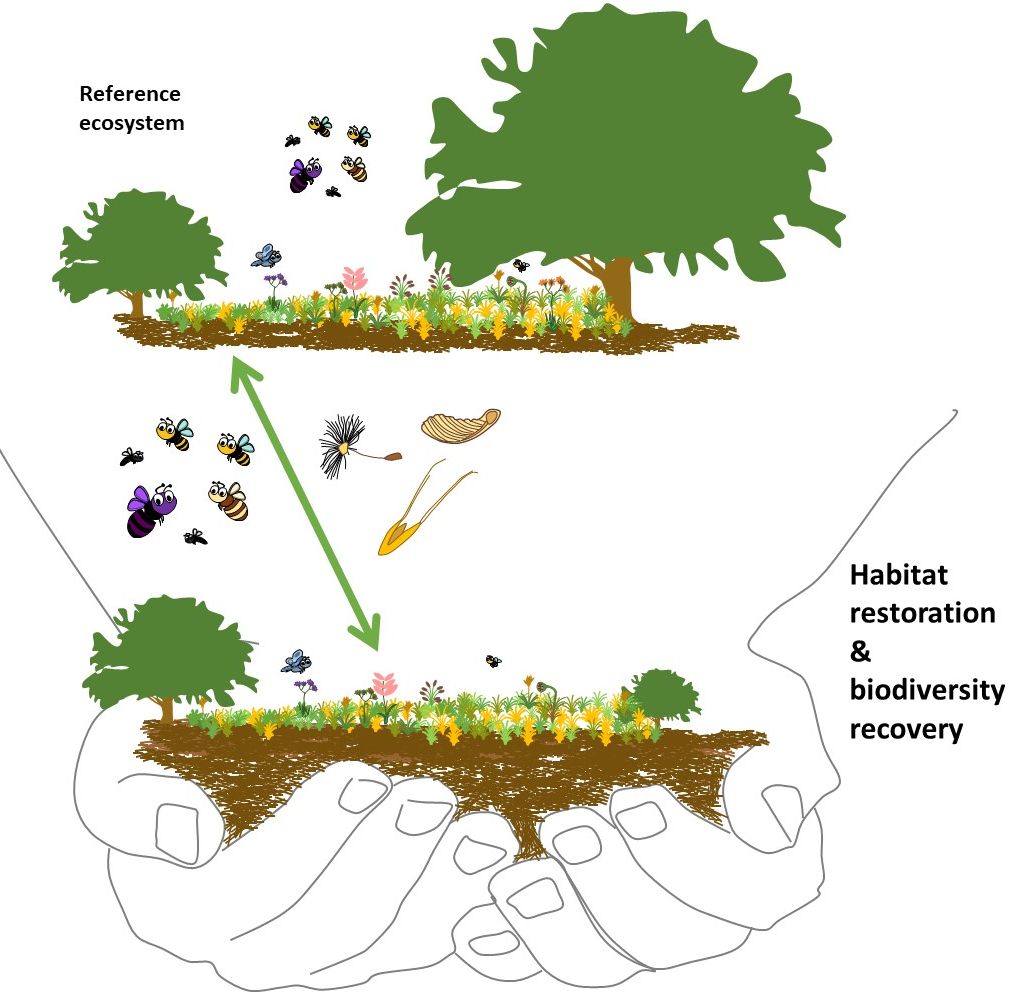
Studio
Darwin Entertainment Centre
Symposium #20 Assisted Natural Regeneration Alliance: Promoting opportunities and benefits of natural regeneration of forests and savannas at local, regional and global scales. Organiser: Robin Chazdon
Gallery
Darwin Entertainment Centre
Climate change is adding new dimensions to ecological restoration. Restoring ecological resilience in existing ecosystems has become an important driver for restoration to maintain ecological functions and ecosystem services in an uncertain climate future. The talks in this open session address the complex nature of restoring ecological resilience for climate adaptation and climate mitigation.
Ballroom A
DoubleTree Hilton
Kakadu Room
DoubleTree Hilton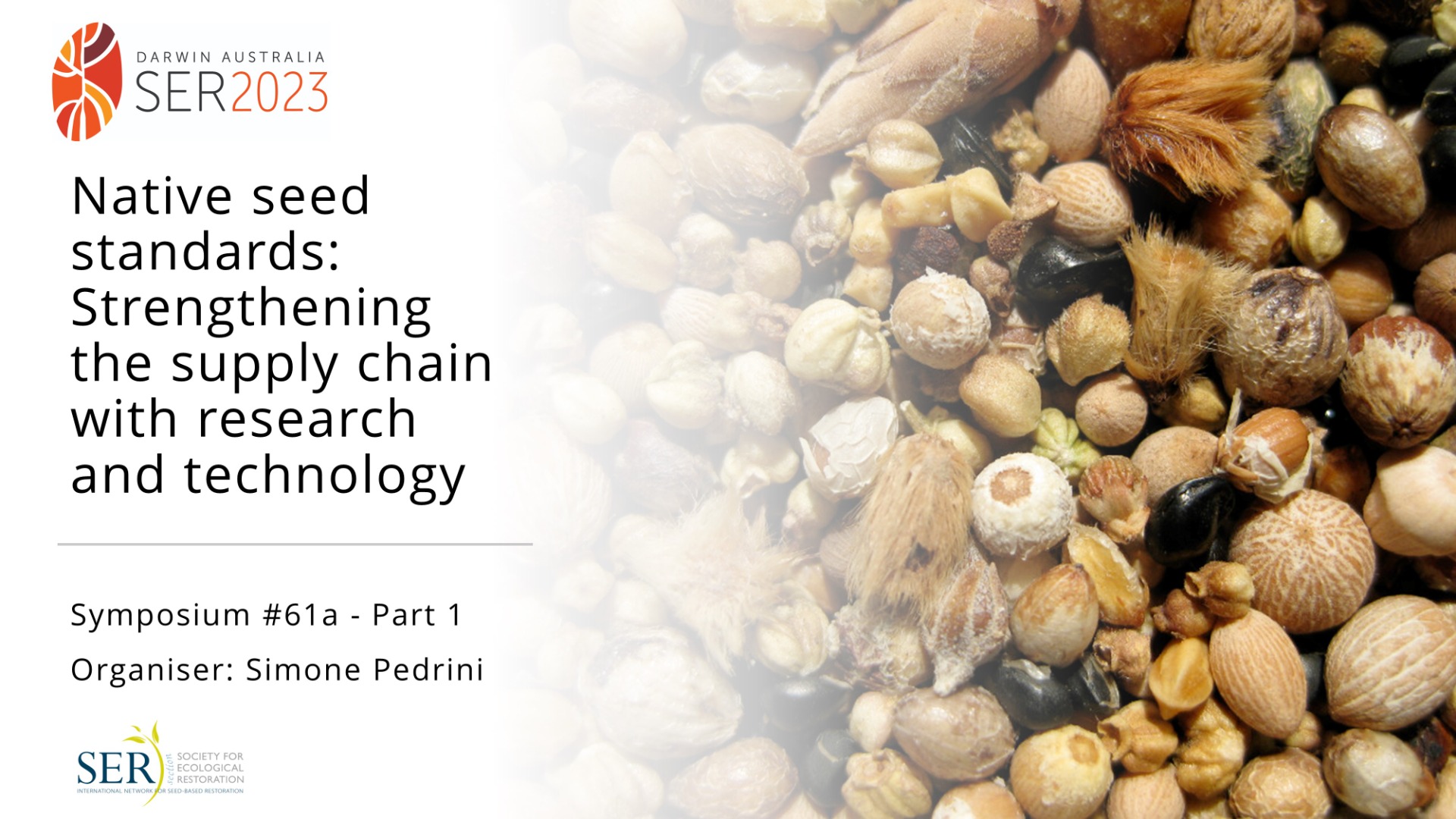
Symposium #61a Native seed standards: Strengthening the supply chain with research and technology - Part 1. Organiser: Simone Pedrini
Native seeds are a key component of most ecological restoration projects. The International Network for Seed-Based Restoration (INSR), a thematic section of SER, in collaboration with a wide range of international experts, has recently developed the First International Standards for Native Seeds in Ecological Restoration (2020). In this series of papers, each step of the native seed supply chain is analysed in depth and recommendations on how to improve the science and practice underpinning the reliable supply and effective use of native seeds are provided. Since the Native Seed Standards were published, numerous researchers and practitioners (from around the world) have been performing experiments and developing new methodologies and technologies to address the major bottlenecks in the native seed supply chain.
In these symposia, some of the top world experts on the topic will discuss the principles and present new scientific and practical outcomes to strengthen each step of the native seed supply chain.
Litchfield Room
DoubleTree Hilton
Symposium #27 Restoration Monitoring: Multiple approaches for measuring restoration impacts. Organiser: Cézar Borges
Lobby Lounge
DoubleTree Hilton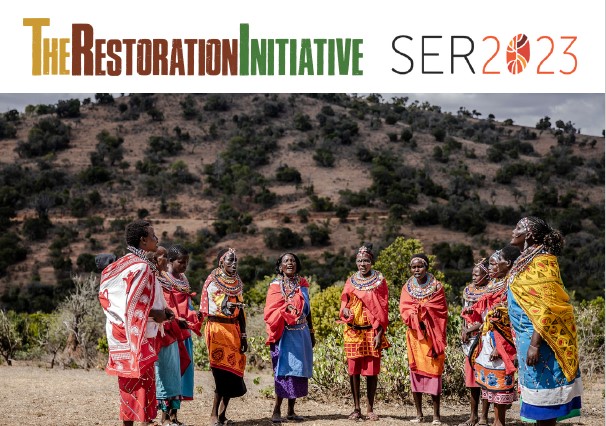
Workshop #24 The Restoration Initiative Program: experience from the field to scale up forest and landscape restoration (90 mins). Organiser: Benjamin De Ridder, FAO.
The Restoration Initiative (TRI) brings the collective strengths and resources of three leading institutions:the International Union for Conservation of Nature, the Food and Agriculture Organization of the UnitedNations and the UN Environment Programme, together with ten Asian and African countries to transformrestoration ambition into results.
The aim of this session is to share experiences and lessons learned through understanding the principles offorest and landscape restoration practices and its actual implementation in the field.
Participants will be able to engage with country representatives who will present examples of the variedtechnical tools and approaches provided by the programme to plan, implement and monitor restoration inconjunction with local knowledge that are enabling transformation from restoration ambition into results.
Territory Room
DoubleTree Hilton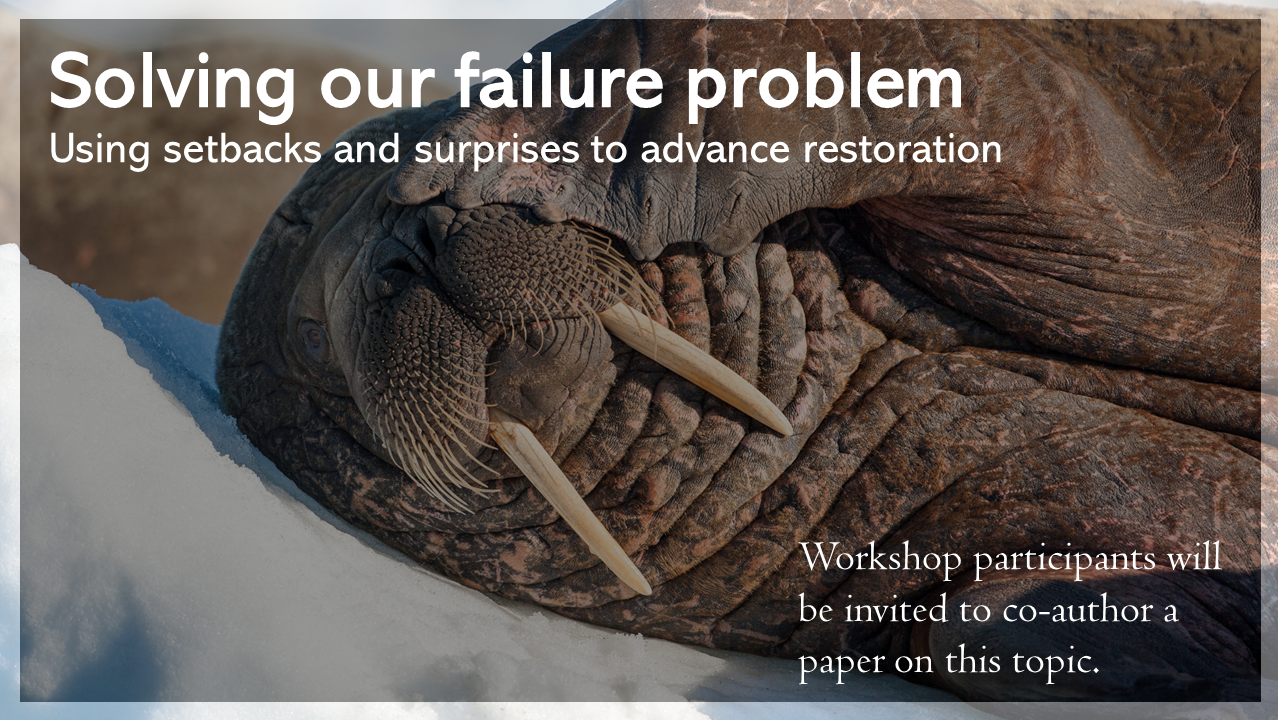
Workshop #106 Solving our failure problem: using setbacks and surprises to advance restoration. Organiser: Emily Gonzales
To improve the success rate of ecological restoration projects, this 60-120 min workshop invites contributors from diverse backgrounds and sectors to discuss the social, scientific and institutional barriers to learning from failure.
This workshop may result in the initiation of a co-authored publication with interested workshop participants.
Restoration professionals need to know what works and what doesn’t when planning, implementing, analyzing and adapting restoration projects. As a relatively new discipline and practice, ecological restoration is rife with knowledge gaps. In a way, ecological restoration is like a “start-up tech company” in which failing fast and early could be rapidly advancing knowledge and building evidence. Other sectors such as the military, aviation and engineering have long embraced failure to advance learning and adapting, however, restoration has been slower to adopt a “failing forward” mindset. In 2009, the journal Restoration Ecology created a “setbacks and surprises” section to provide authors with the opportunity to present results from projects and studies that ostensibly failed. The journal’s editors recognized that failure is integral to the adaptive management and learning process, that silence does not equal science. Although “failing forward” webinars and sessions at conferences are well attended, a safe to fail cultural shift within institutions and between organizations and funders has yet to occur. Failure remains stigmatized and positive outcomes are still published far more often than negative, equivocal, or unexpected outcomes. The purpose of this workshop is to understand how failure is socialized and communicated and the social, scientific and institutional barriers to learning from failure.
Darwin Room
DoubleTree Hilton
Symposium #68 Financing Blue Carbon to Deliver Critical Ecosystem Services in a Changing Climate: Uncovering Hidden Values to Promote Climate Change Adaptation. Organiser: Carolyn Einig
Ballroom B
DoubleTree Hilton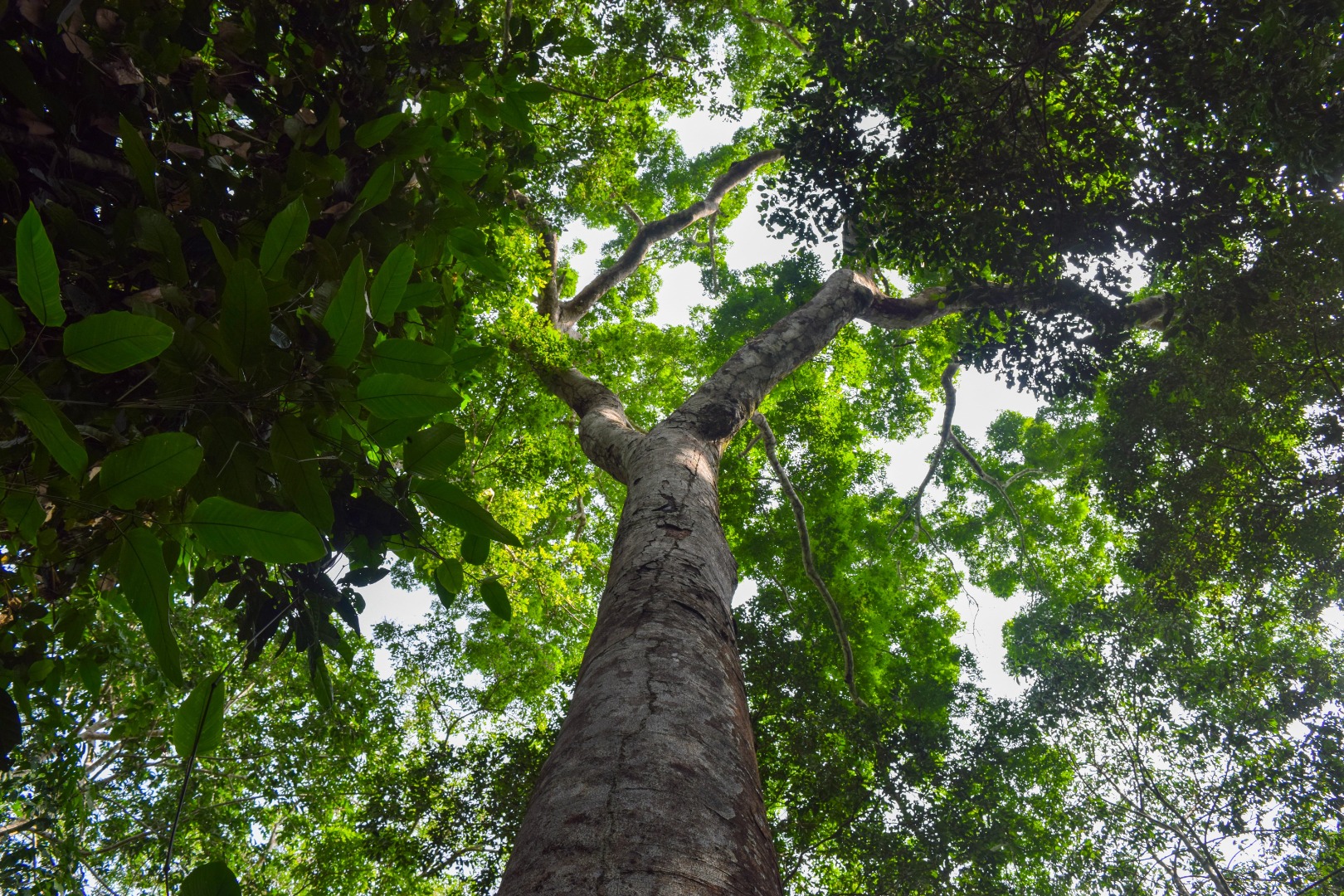
Symposium #51 The Tools to Deliver Forest Landscape Restoration: challenges and opportunities for scaling up. Organiser: Theresa Keith
An exploration of the latest opportunities, challenges, and developments in Forest Landscape Restoration, with an emphasis on connecting to climate impacts, tapping in to sustainable investment, and directing users to a practical set of tools that will allow for the scaling up of restoration endeavors worldwide.
Playhouse
Darwin Entertainment Centre
Lobby Lounge
DoubleTree Hilton
The Assisted Natural Regeneration (ANR) Alliance was created in 2022 to stimulate wide adoption and provide technical and policy guidance for ANR as a large-scale, low-cost and effective restoration practice in rural communities across the world, with regional nodes in in Asia-Pacific, Africa, and Latin America-Caribbean. The ANR Alliance goal is to build an international and multisectoral coalition to promote the exchange of knowledge and experiences between countries, regions and stakeholders (at subnational, national and international scales) to support the technical and political adoption of ANR.
The side event will be an open discussion session (1 hour, 12:45 to 1:45 pm) during lunch on Friday, 29 September. This session will provide information regarding the mission of the Assisted Natural Regeneration Alliance and will be an opportunity to answer questions and informally discuss the ANR Alliance Draft Strategy and Action Plan. Ideally, the session will follow the ANR Alliance Symposium entitled Assisted Natural Regeneration Alliance: Promoting opportunities and benefits of natural regeneration of forests and savannas at local, regional and global scales.
The first 30 minutes of the session will involve three 10-minute presentations to provide information regarding (1) How ANR practices are linked to ecosystem restoration, (2) scope and mission of the ANR Alliance (including the provisional organizational structure), (3) the Strategy and Draft Action Plan to be submitted to a peer review and consultation process.
The rest of the session will be Q&A (15 minutes) and break-out groups (15 minutes). We will arrange four different breakout groups, focused on 1) implementation, 2) enabling policies, 3) capacity development and information sharing, and 4) economic costs and benefits. Participants will be invited to sign up to receive further information regarding membership and partnership with the ANR Alliance.
Who should attend? Conference participants interested in natural regeneration-based restoration approaches, UN Decade on Ecosystem Restoration partners and advisory committee, decision makers and representatives of government, companies and non-government organizations that are interested in promoting implementation and documenting cost-effective benefits of ANR.
Lobby Lounge
DoubleTree Hilton
Symposium #93 Opportunities and challenges in scaling up forest and landscape restoration: perspectives of the Global Partnership on Forest and Landscape Restoration. Organiser: Anita Diederichsen
Playhouse
Darwin Entertainment Centre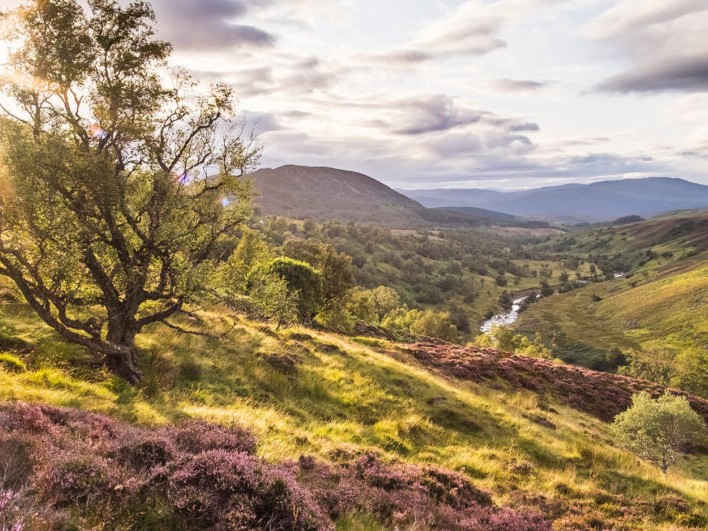
Symposium #39 Rewilding, Restoration and the increasing valuation of biodiversity across the globe. Organiser: Renee Young
The world has made a fundamental shift since we met online for the virtual SER2021 conference. At that time, we were still amid the global COVID-19 pandemic. In the corporate world, the state of the environment was big on the agenda but largely in the context of climate and reducing CO2 emissions. Since then, we have had COP15 and the signing of the Global Biodiversity Framework; the Taskforce for Nature Related Financial Disclosures has been developed. The challenges of valuing nature now face governments, large corporations and the finance sector worldwide. Different approaches to minimise impacts and support ecological recovery are being explored with no one approach emerging as a clear front runner. In this symposium we look at some key elements of the global pivot to support nature positive future. We look at approaches for ecological recovery through rewilding and restoration, natural capital accounting approaches across borders, and where we might be heading in terms of the global drivers of ecological restoration.
Studio
Darwin Entertainment Centre
Symposium #67 Assessing socioecological impacts from large scale tropical forest restoration: improving lives throughout the forests. Organiser: Leonardo Ferreira da Silva
Gallery
Darwin Entertainment Centre
Symposium #98 From species to communities to ecosystems: Scaling ecological models to support restoration decision making. Organiser: Brook Herman
Ballroom A
DoubleTree Hilton
Ballroom B
DoubleTree Hilton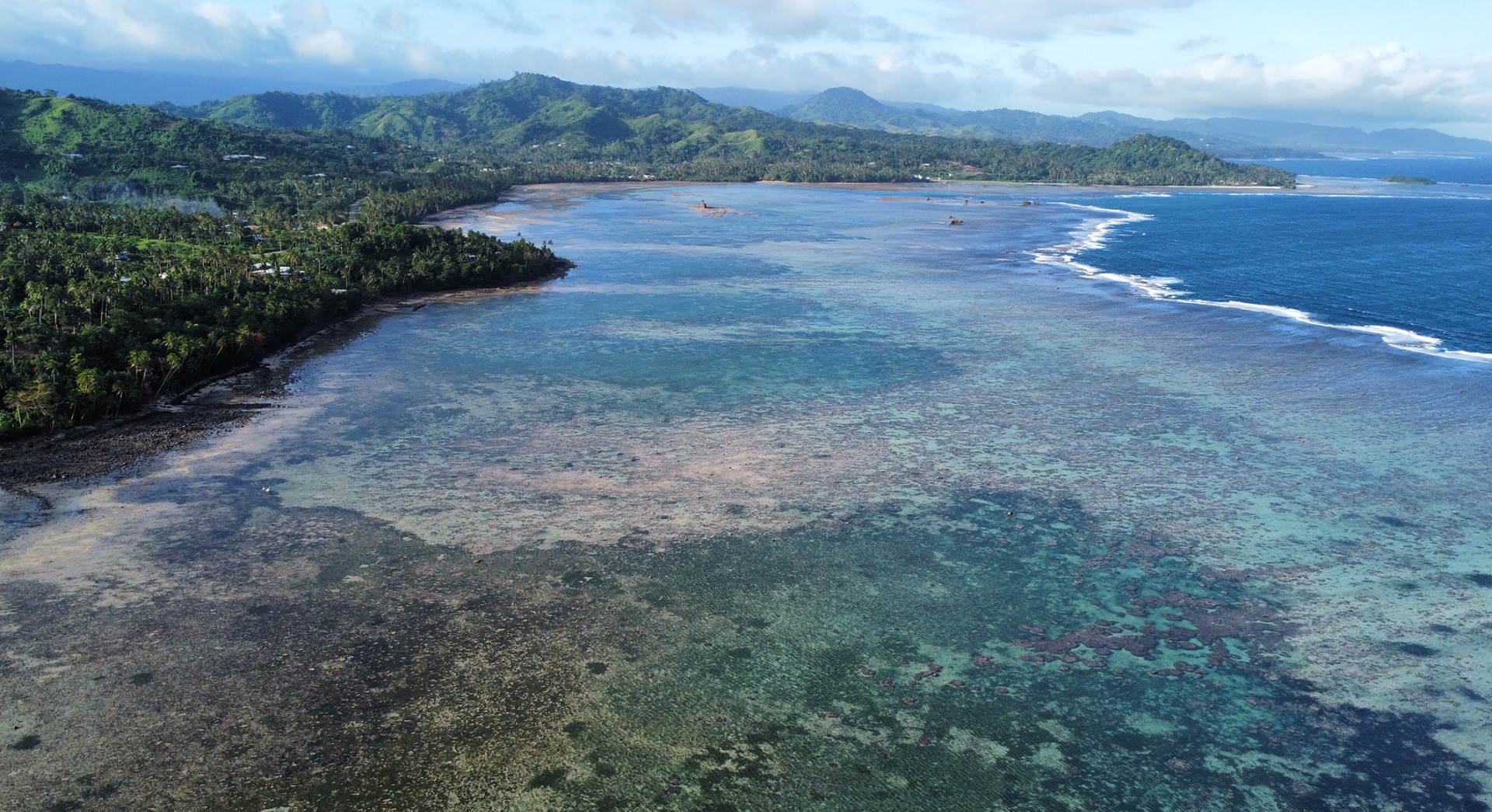
Symposium #65 Restoring seascapes: Harnessing multi-habitat restoration to restore seascapes at scale. Organiser: Simon Reeves
This symposium will provide perspectives of how the marine restoration community can harness multi-habitat restoration of seascapes, to deliver benefits for both nature and people at scale.
Session Image Details: Coastal habitats, like this one in Tacilevu, Fiji, are highly productive and diverse, supporting livelihoods and biodiversity. Facilitative, or positive, cross-habitat interactions, such as wave breaking by coral reefs or sediment trapping by seagrass and mangroves, enable other habitats to persist and thrive. And yet, restoration activities are not usually planned across multiple habitat types. Image credit: Joey Crosswell (CSIRO, Dutton Park, Australia).
Kakadu Room
DoubleTree HiltonSymposium #61b Native seed standards: Strengthening the supply chain with research and technology - Part 2. Organiser: Nancy Shaw
Native seeds are a key component of most ecological restoration projects. The International Network for Seed Based Restoration (INSR), a thematic section of SER, in collaboration with a wide range of international experts, has recently developed the First Internationl Standards for Native Seeds in Ecological Restoration (2020). In this series of papers, each step of the native seed supply chain is analysed in depth and reccomandation on how to improve the science and practice underpinning the reliable supply and effective use of native seeds are provided. Since the Native Seed Standards were published, numerous researchers and practitioners (from around the world) have been performing experiments and developing new methodologies and technologies to address the major bottlenecks in the native seed supply chain.
In these two symposia, some of the top world experts on the topic will discuss the principles and present new scientific and practical outcomes to strengthen each step of the native seed supply chain.
Litchfield Room
DoubleTree Hilton
Workshop #87 Learning from Implementers about Monitoring Restoration: Lessons Learned, Challenges, and Benefits. Organiser: Isabel Hillman
Lobby Lounge
DoubleTree Hilton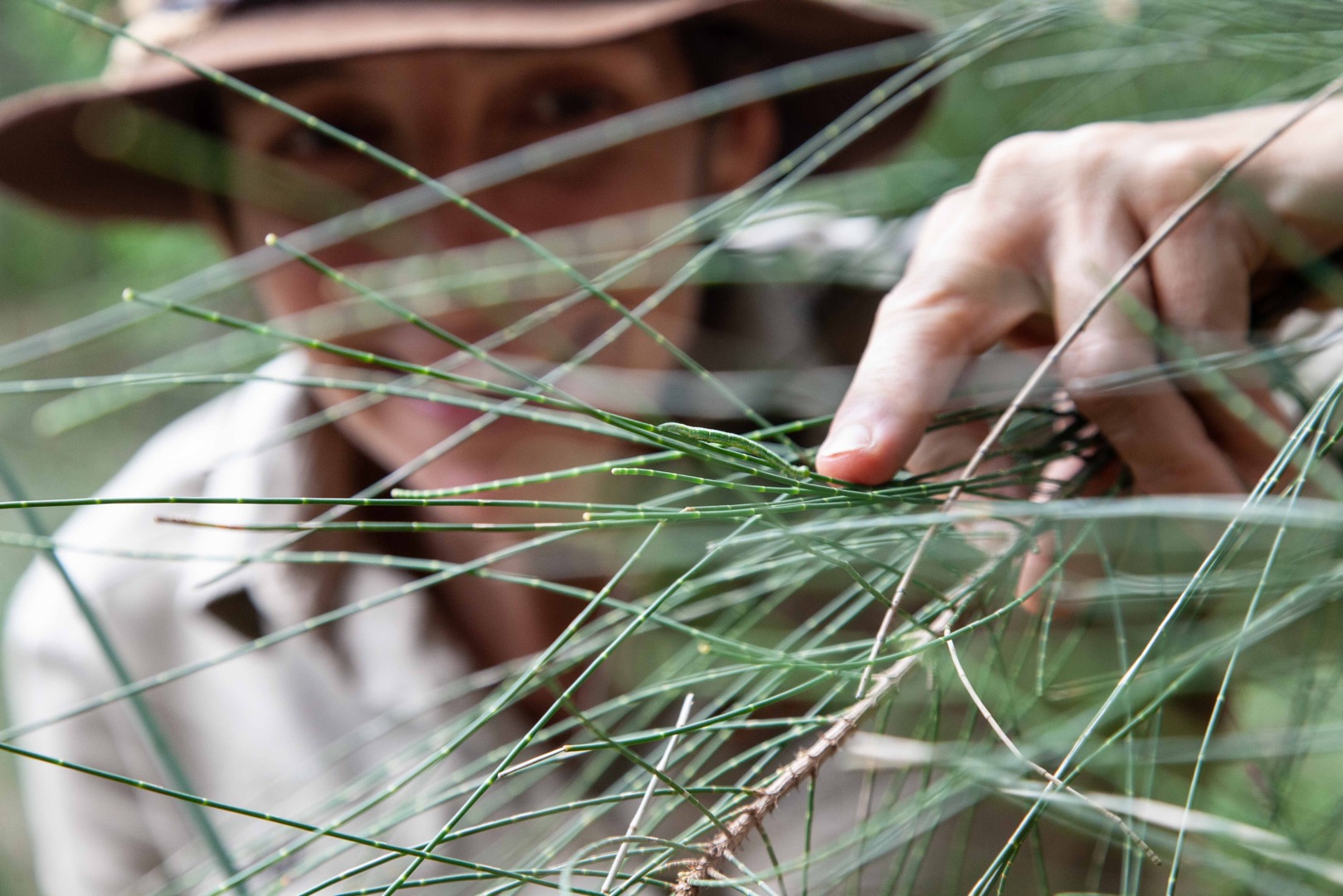
Workshop #62 Regen is for everyone! Approaches, tools and techniques of holistic bush regeneration, and empowering community to relearn, regenerate and reconnect. Organiser: Tali Shelley
ecological restoration is CULTURAL restoration.. we are all part of ecology.
bushtekniq shares the ways of the holistic regenerator:
ways to relearn, regenerate, reconnect.
regen is for everyone!
Darwin Room
DoubleTree Hilton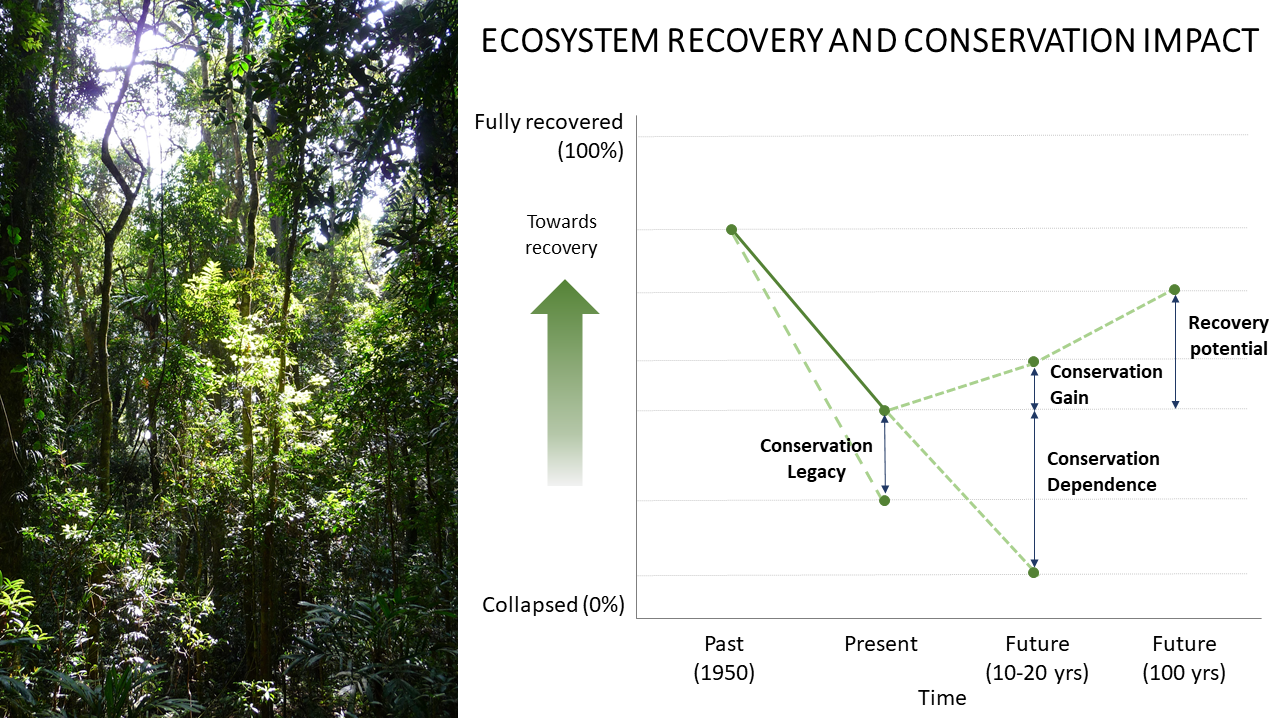
The workshop will showcase and seek feedback on the draft IUCN Green Status of Ecosystems guidelines, which is a framework to assess recovery status, conservation success and recovery potential of ecosystem types. It is open to all SER2023 participants.
Ecosystem restoration is now at the forefront of the global conservation agenda: the UN Decade on Ecosystem Restoration (2021-2030) and CBD Global Biodiversity Framework have driven increased calls to conserve and restore ecosystems, to sustain biodiversity and ecosystem services. There is a push to reverse ecological degradation and shift towards upward trends of recovery. It is essential that restoration efforts are evaluated so that progress towards ecosystem recovery can be tracked at global scales. Yet no standardised method to measure, evaluate and compare recovery outcomes for ecosystem types exists. To fill this gap, an IUCN Commission on Ecosystem Management Task Force is working to develop the IUCN Green Status of Ecosystems, which will provide a method to identify the extent to which threatened ecosystems globally will be able to recover, and how effective past actions have been.
In this workshop, we will outline the aims and draft methods of the IUCN Green Status of Ecosystems. We will also present an overview of the complementary IUCN Green Status of Species, as context for what the ecosystems equivalent will aim to achieve over the next few years. The workshop will be an opportunity for restoration policy makers, practitioners and researchers to valuable input into the proposed Green Status of Ecosystems methods. We will ask participants for feedback on how to improve their clarity and relevance to decisions. We welcome anyone who is interested to attend!
Speakers: Dr Jessica Walsh (Monash University, Co-Chair IUCN Green Status of Ecosystems Task Force), Dr Molly Grace (University of Oxford, Co-Chair IUCN Green Status of Species Working Group)
Facilitators: Prof Cara Nelson (University of Montana), Dr Michael Sievers (Griffith University)
Territory Room
DoubleTree Hilton
Symposium #34 Accelerating progress in Latin America under the UN Decade on Ecosystem Restoration:Innovations for large-scale efforts to recover degraded landscapes. Organiser: Trevor Walter
Playhouse
Darwin Entertainment Centre
Studio
Darwin Entertainment Centre
Gallery
Darwin Entertainment Centre
Workshop #105 Online tools, best practices and support from the Global Mangrove Alliance to improve national mangrove management and conservation. Organiser: Dominic Wodehouse
Territory Room
DoubleTree Hilton
Kakadu Room
DoubleTree Hilton
Symposium #82 Evolving the People to Wetlands Connection: Implementing Rights of Wetlands. Organiser: Gillian Davies
Ballroom B
DoubleTree Hilton
This lightning talks session is designed to facilitate rapid dissemination of cutting-edge research and practical insights related to seeds and soil in restoration ecology. The session will cover an array of topics, including seed sourcing under climate change, post-fire restoration in shrublands, and soil health in various ecosystems. Each presenter will have a brief window to articulate their findings, thereby offering a condensed yet comprehensive overview of emerging trends and methodologies in the field.
Litchfield Room
DoubleTree Hilton
Lobby Lounge
DoubleTree Hilton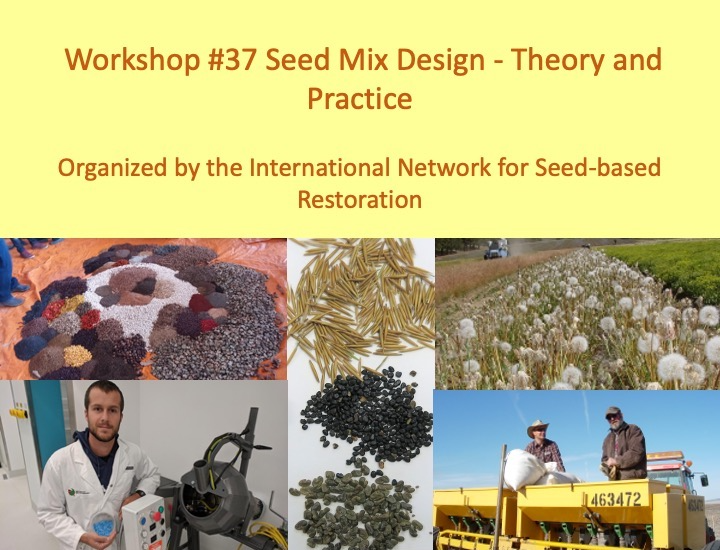
Workshop #37 Seed Mix Design - Theory and Practice. Organisers: Marcello DeVitis, Leah Prescott, Eduardo Malta, and Nancy Shaw
Seed mix calculator spreadsheets available here: https://drive.google.com/drive/folders/1lEhHTlniMRAkWRLA-TL9uOR8EOU4NYEe?usp=drive_link
Darwin Room
DoubleTree Hilton
Ballroom A
DoubleTree Hilton
Ballroom B
DoubleTree Hilton
Playhouse
Darwin Entertainment Centre
Workshop #116 Getting published in Restoration Ecology: a workshop for students and early career professionals. Organiser: Valter Amaral
Territory Room
DoubleTree Hilton
Symposium #54 Desertic Natural Heritage Restoration: Lessons learned from AlUla Arid Landscapes Restoration. Organiser: Ahmed Mohamed.
Playhouse
Darwin Entertainment Centre
Studio
Darwin Entertainment Centre
Gallery
Darwin Entertainment Centre
Ballroom A
DoubleTree Hilton
Ballroom B
DoubleTree Hilton
Kakadu Room
DoubleTree Hilton
Litchfield Room
DoubleTree Hilton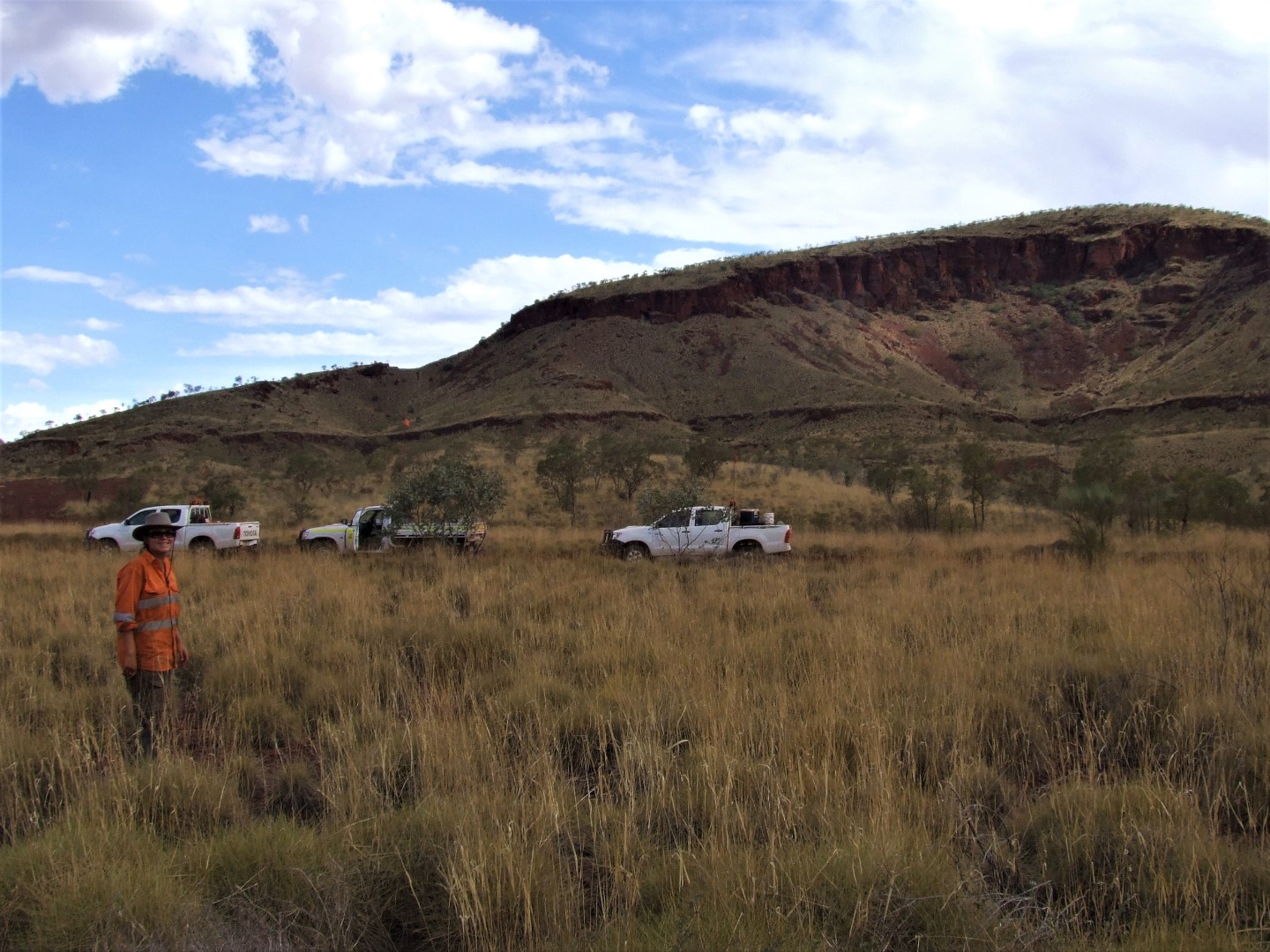
Lobby Lounge
DoubleTree Hilton
Playhouse
Darwin Entertainment Centre
Studio
Darwin Entertainment Centre
Gallery
Darwin Entertainment Centre
Ballroom A
DoubleTree Hilton
Kakadu Room
DoubleTree Hilton
Litchfield Room
DoubleTree Hilton
Lobby Lounge
DoubleTree HiltonOur Partners



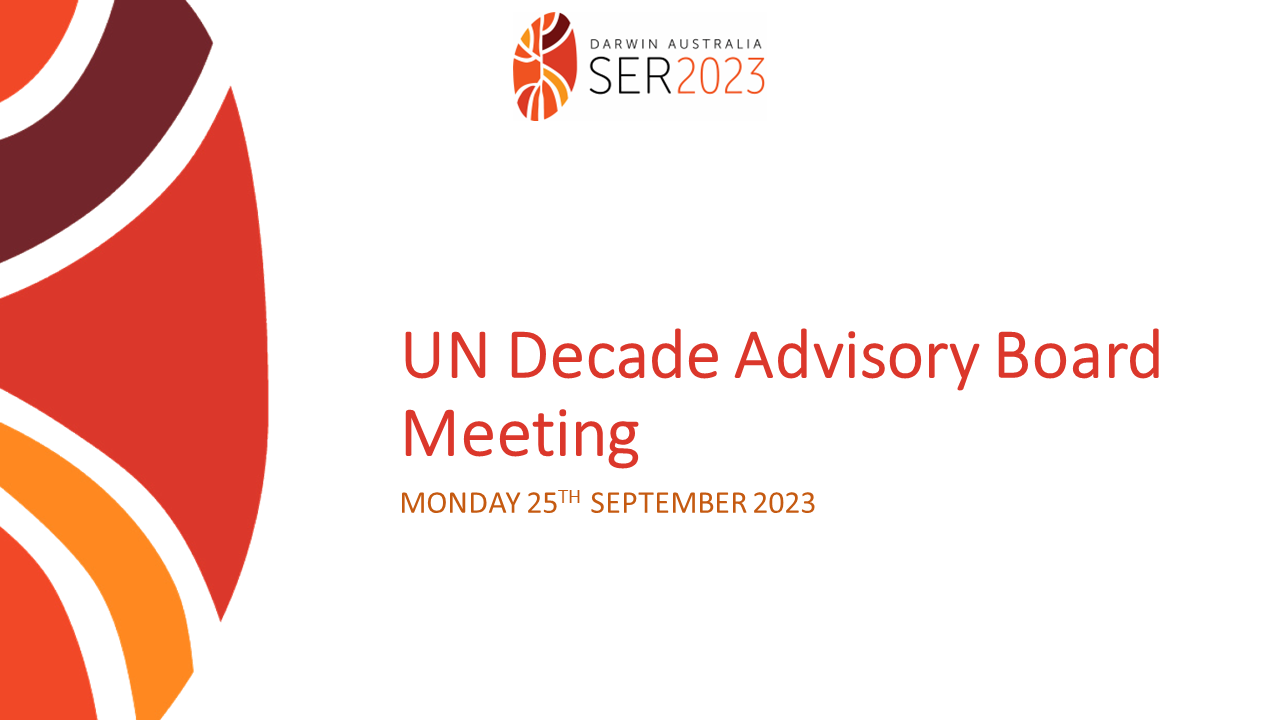
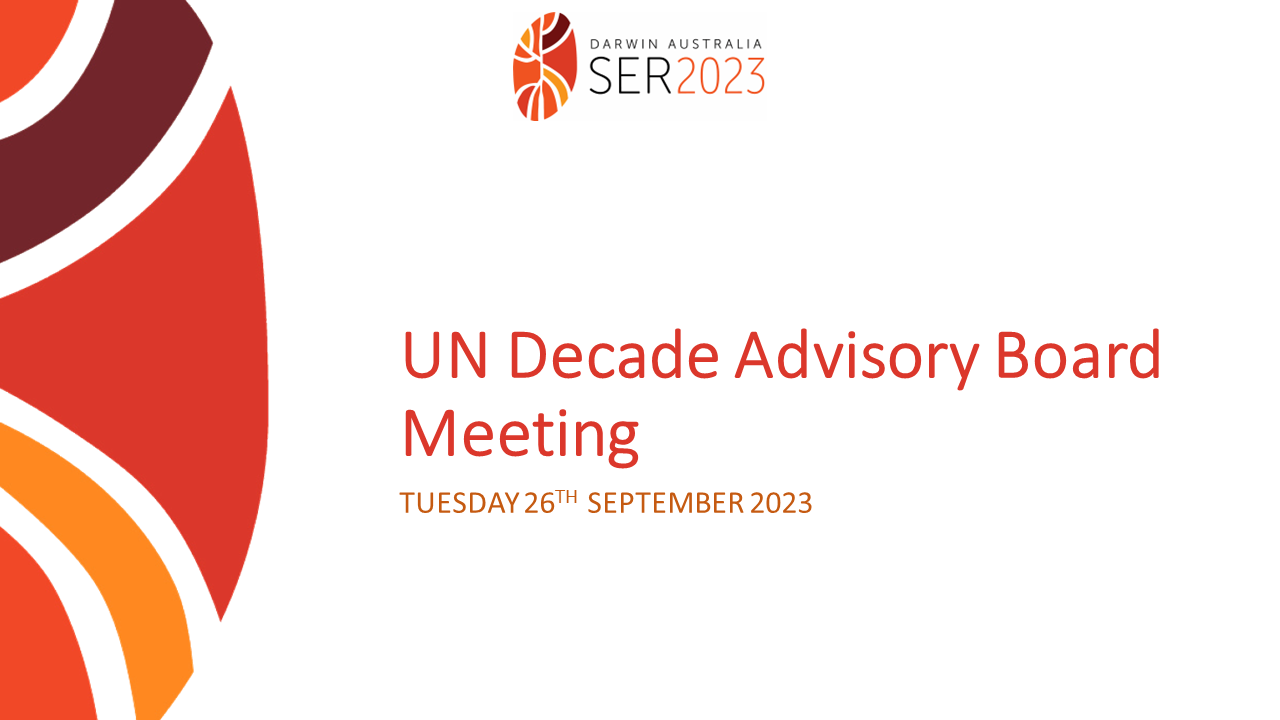
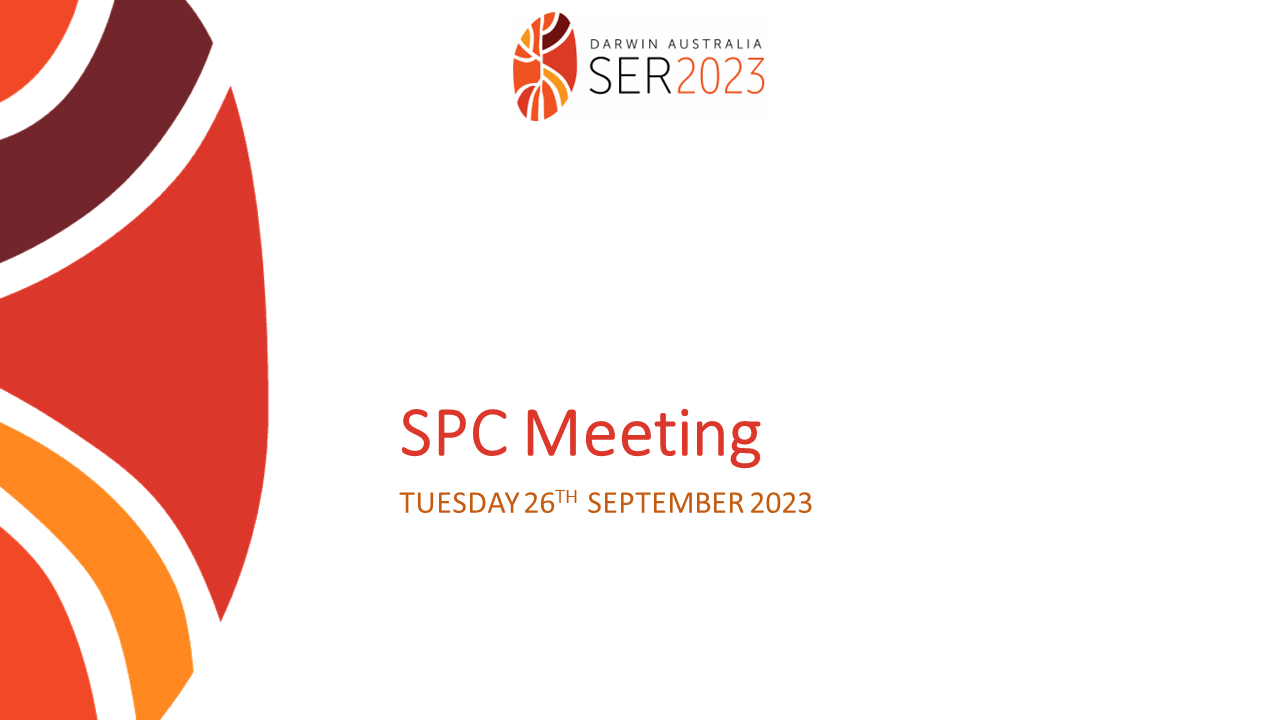
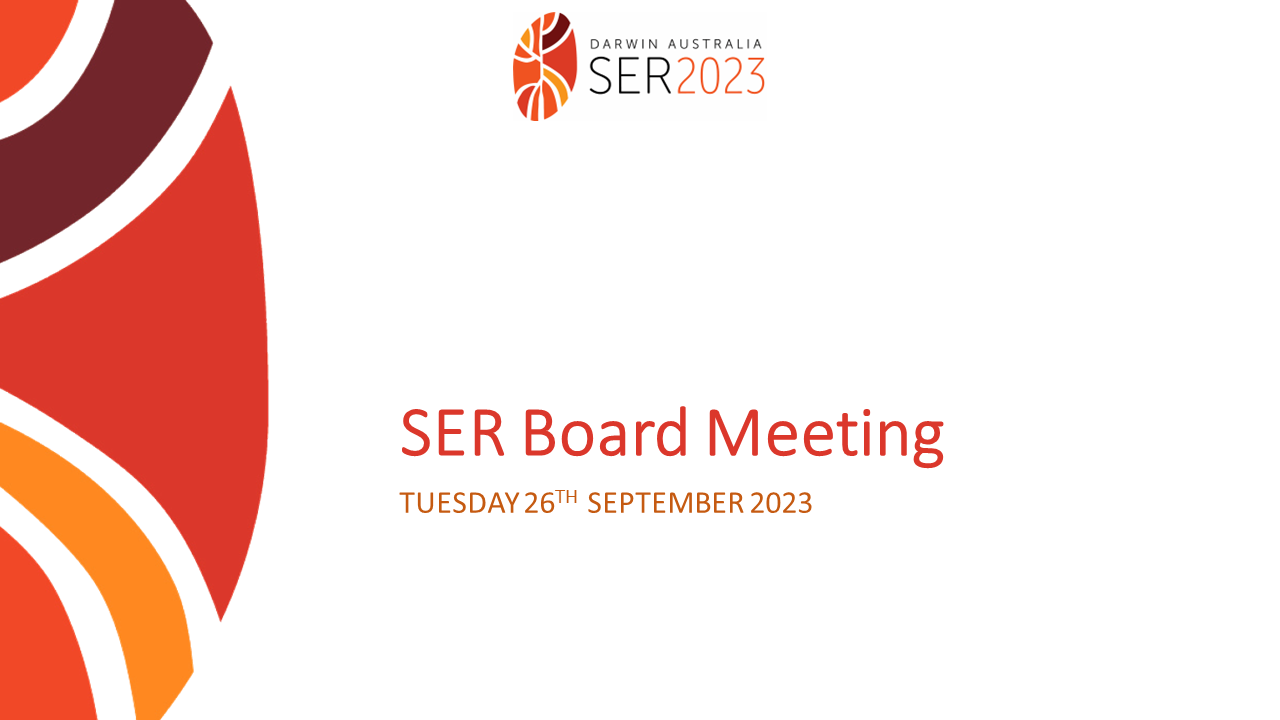
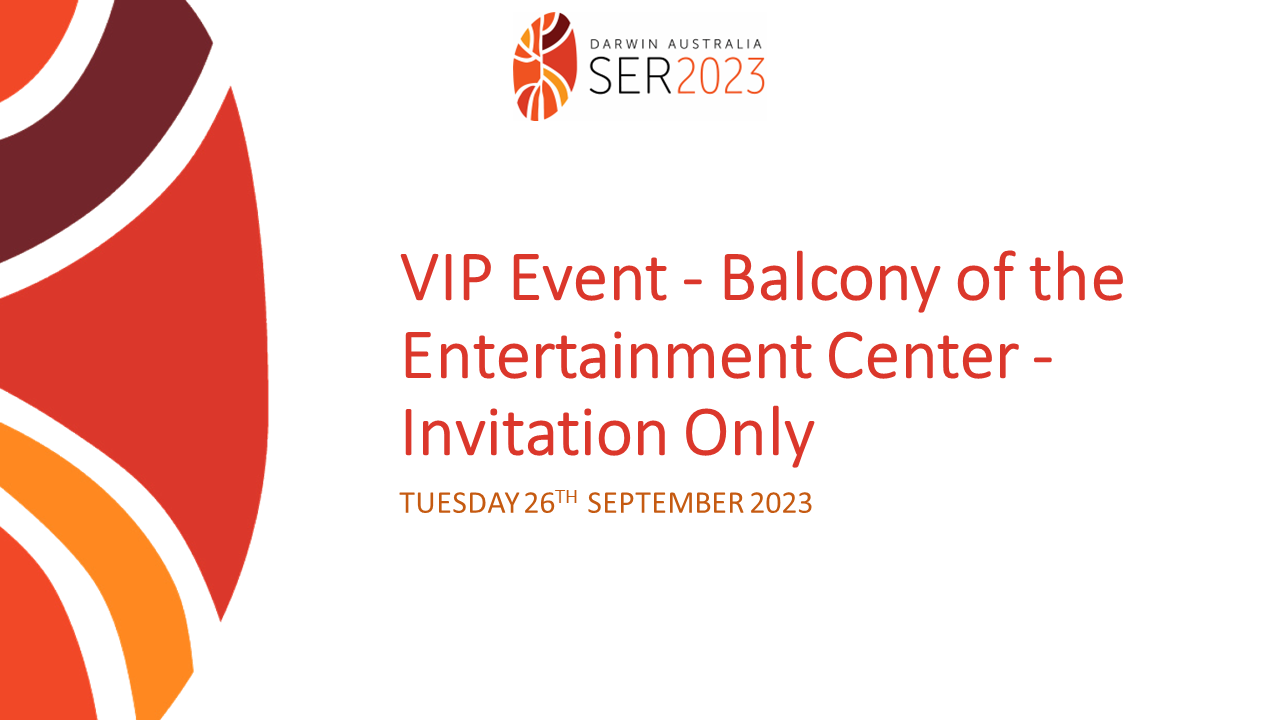
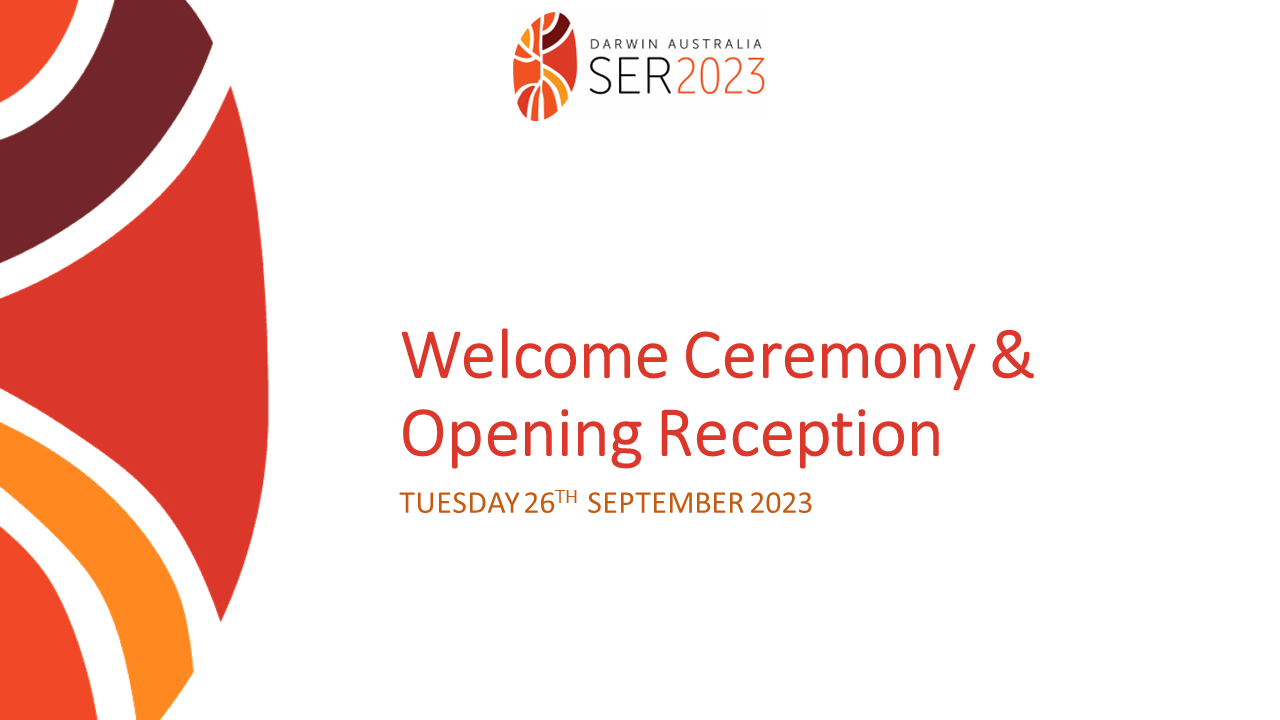
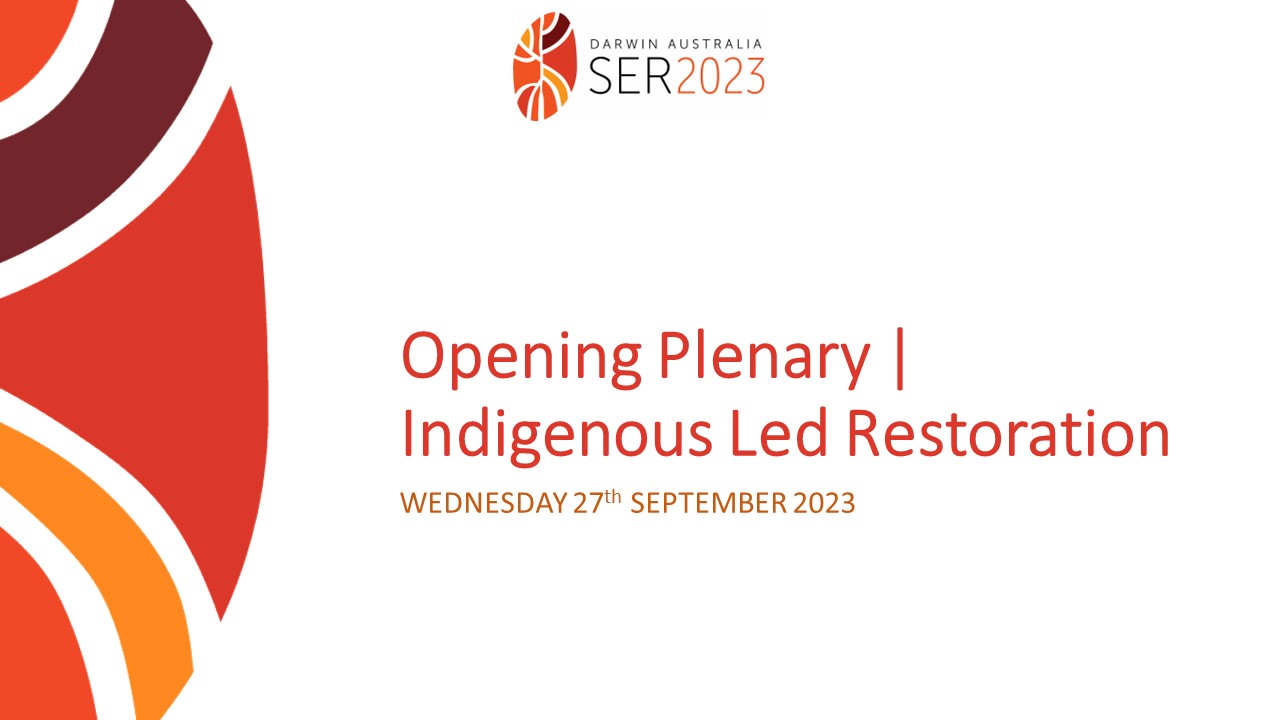
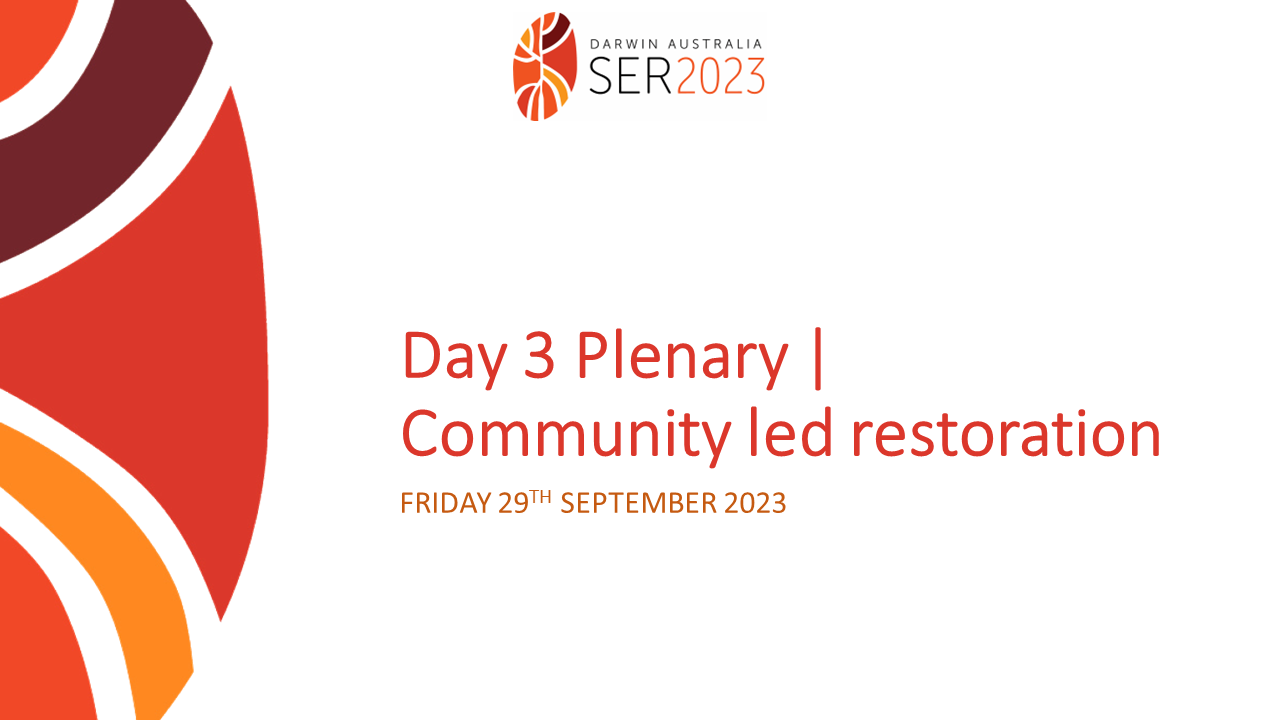
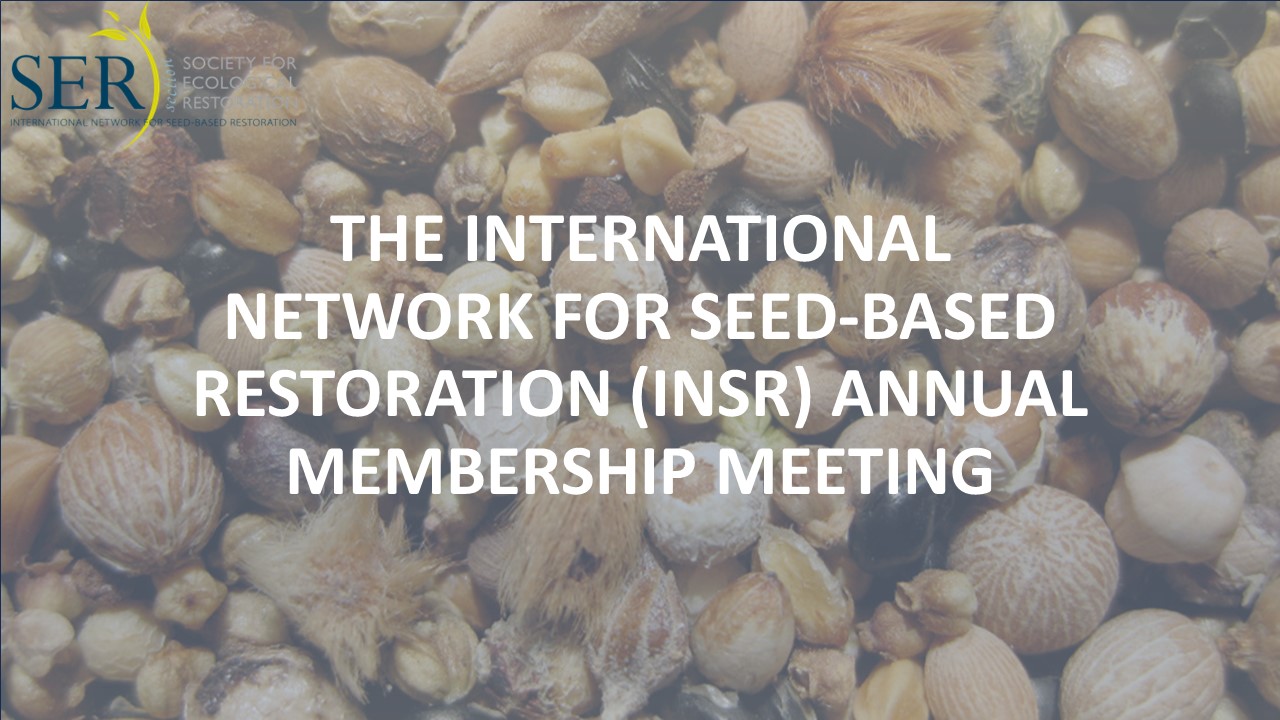
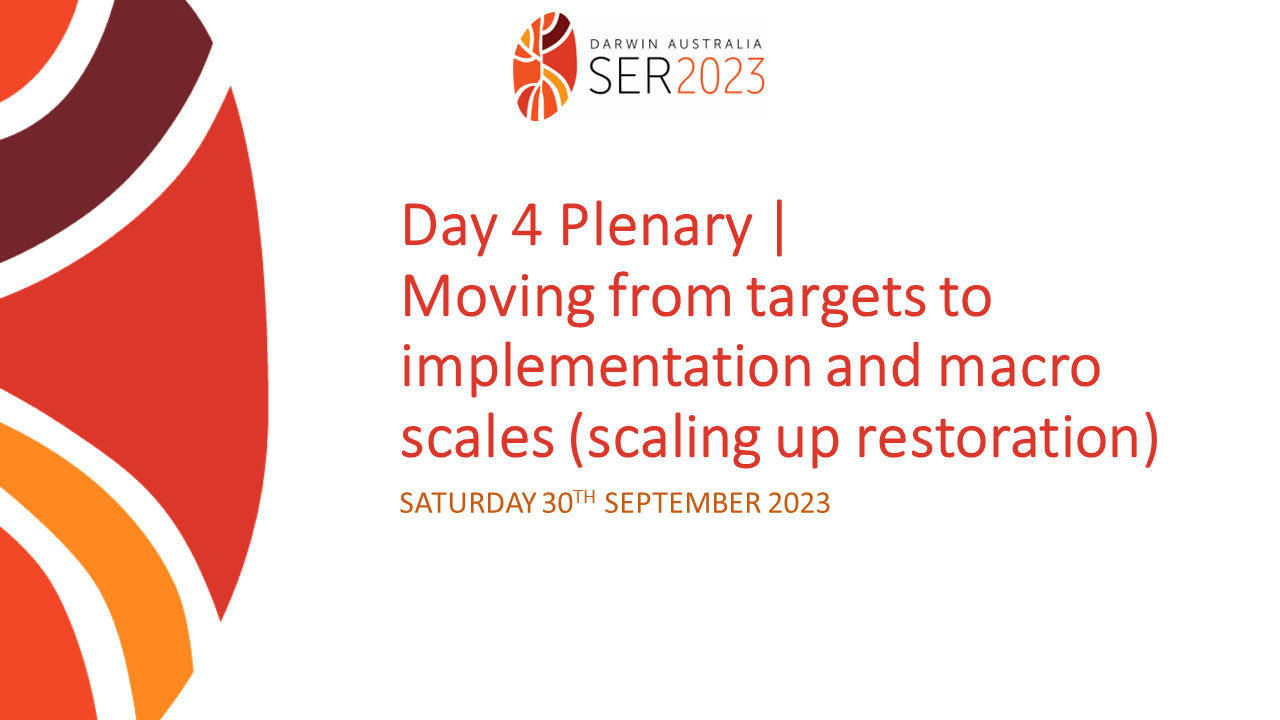
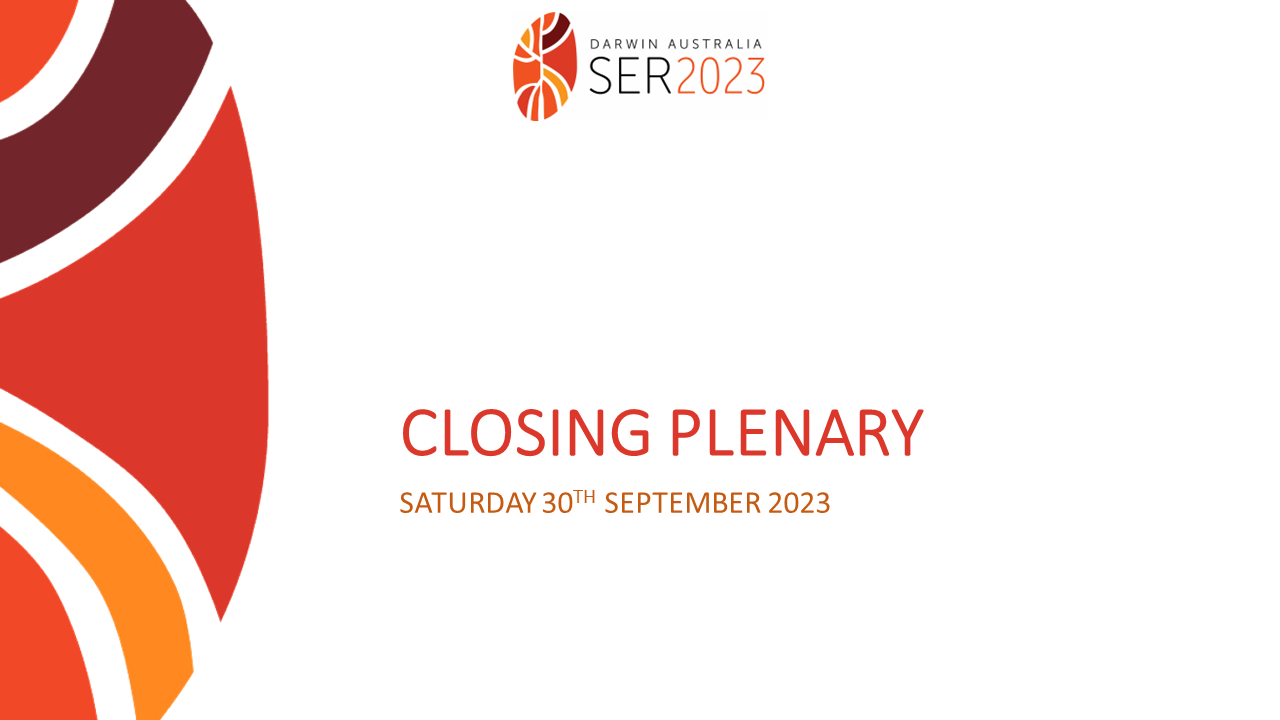
Judges Comments